
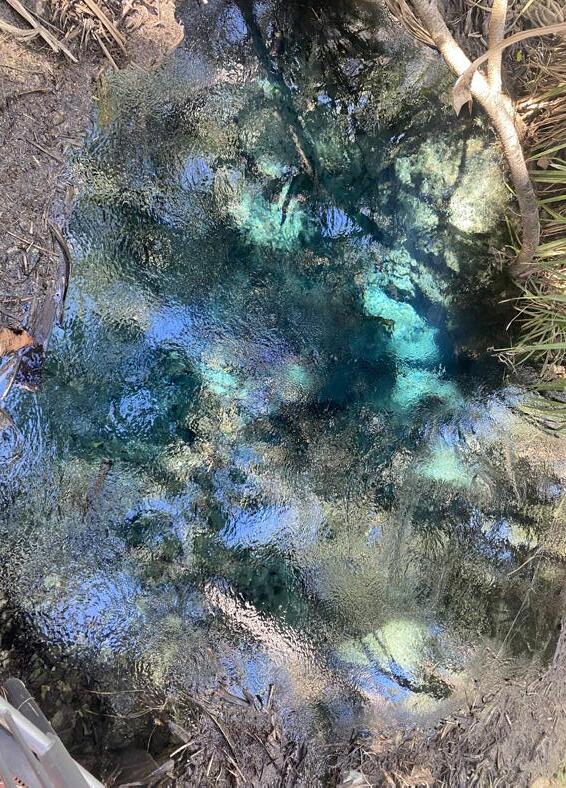



Andrew McNess, bereaved brother of Jeremy
Andrew says: the picture was taken on the 27 June 2025, at the Mataranka Thermal Pools, in Mataranka, NT. It is a beautiful space offering relaxation and rejuvenation.
Photos from Our Runners Up
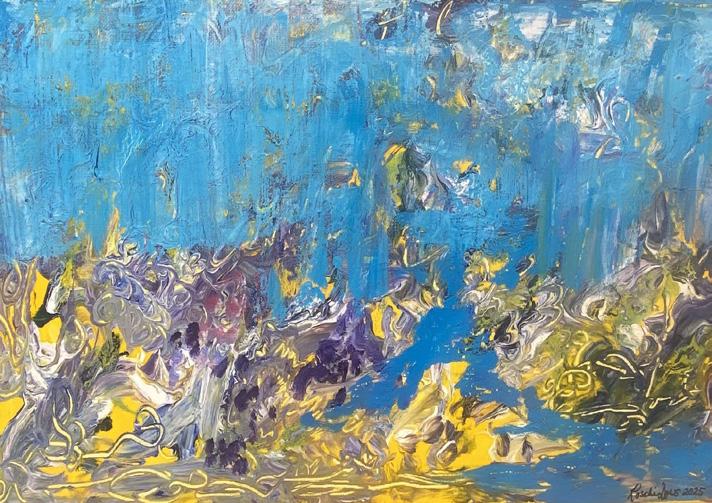
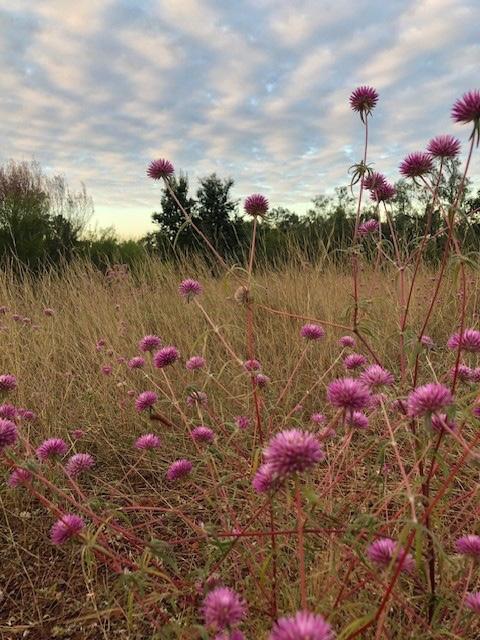
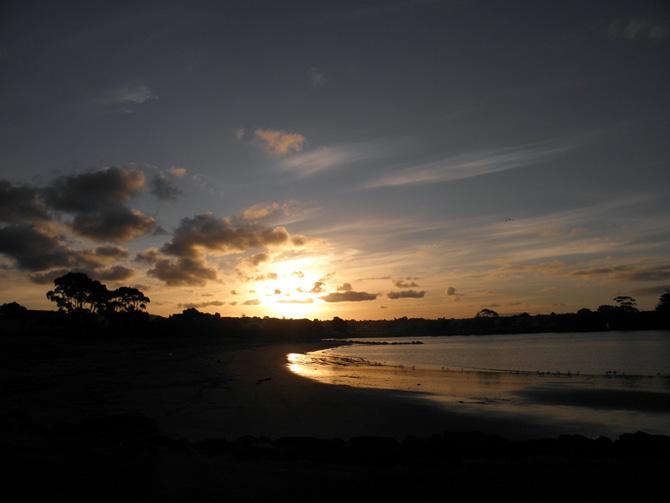
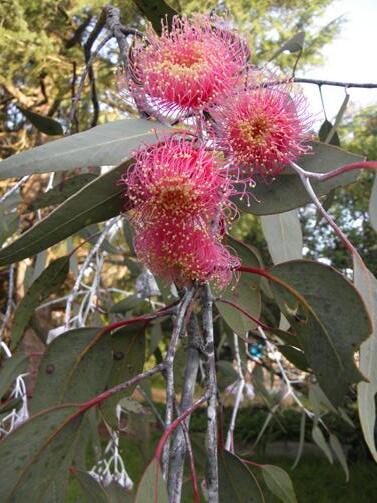
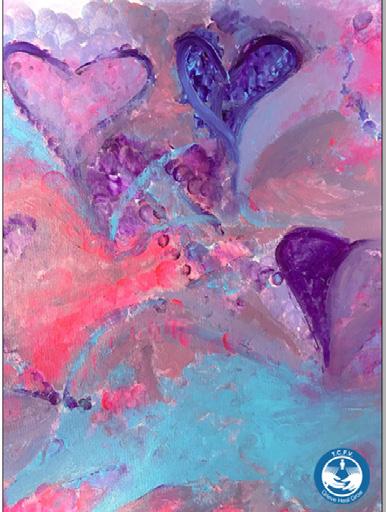
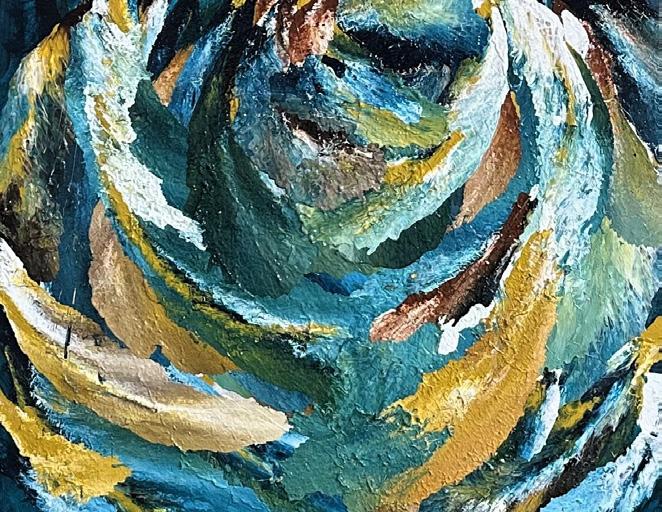
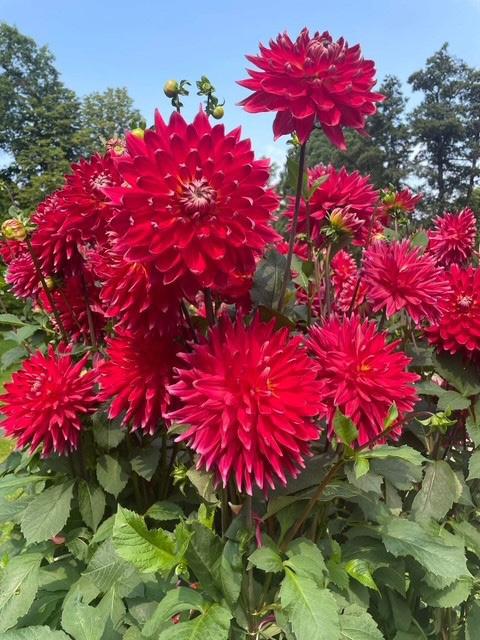
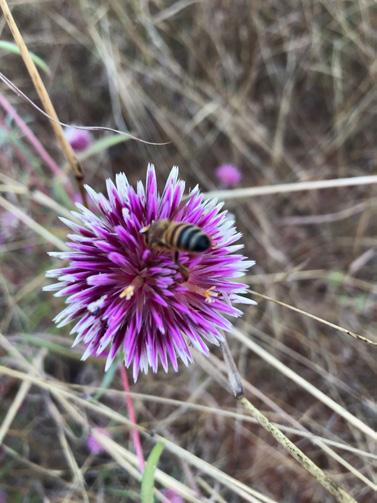

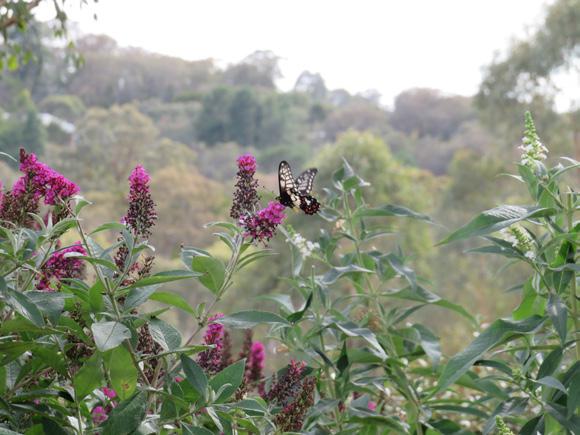
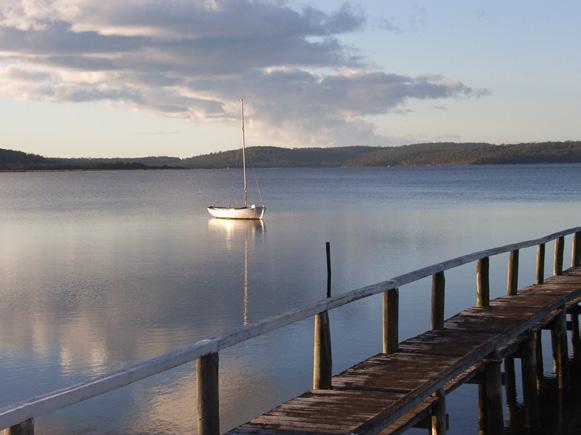

Create the next Compassionate Connections front cover!
Draw, paint take a photo of something
Dear friends
Welcome to the Spring edition of Compassionate Connections.
As I write, we’ve just enjoyed a beautiful 19°c day in early August. It was lovely to feel the warmth of the sun and know that spring is just around the corner. Like many, I always find my mood lifted by a stretch of blue sky and a little sunshine.
Please remember that this is your magazine — a place for you to share stories about your loved ones. We welcome your contributions, whether they’re stories, poems, letters, song lyrics, photos, or artwork. Please email all contributions to me at janem@tcfv.org.au,
please note word documents are preferred for articles.
Don’t forget our cover competition! It’s always such a joy to see everyone’s beautiful photos and artwork. This edition features as many entries as we could fit on page 2, with the winning piece showcased on the cover.
I hope you enjoy the changing of the season — the longer, lighter days ahead and the beautiful spring flowers and blossoms appearing all around us. Sending you all peace and love.
Until next time, take care. ��
Jane Moschetti (Bereaved Mother
In 2019 I was elected to the Board of Management of The Compassionate Friends Victoria (TCFV) and have now completed 2 three-year terms. I am not standing again but am looking forward to expanding into other roles within TCFV. Most of these past 6 years have been in the role of President of the Board.
The experience of being on the Board has been both immensely rewarding and occasionally quite challenging.
Since 2019 the organisation has lived through several significant staff changes and has negotiated a path through the Covid years. Both of these situations have been challenging.
Everyone who has been employed by TCFV comes with the well-being of bereaved people at heart. The difficult decisions to restructure staffing arrangements to strategically improve the delivery of our bereavement support, as well as maintaining the financial viability of the organisation, have been among the more complex parts of the Board role. There has been disappointment and hurt as a result of some of these changes. Being part of a Board making these strategic choices is a core example of the challenge and the reward of the role.
The Covid years are a memory now but in the midst of them the demands on everyone were huge. Fundamental changes were required in simply managing an office. Fundamental changes were required to simply keep offering our bereavement support services to grieving people. It is a testament to the dedication of our staff, volunteers and Board that we managed those years beyond simply surviving. Our services were maintained and even expanded as much was learned in that changed context.
In the post-lockdown years TCFV has now stabilised on a foundation that will enable our services to be delivered effectively and viably into the future.
Our new leadership team and staff, under Alex Hamilton and Andrew McNess, are well set up to consolidate the work done in the 47 years of our history. We are also now well placed to move forward from a solid base to explore how our role in providing bereavement support to grieving people and communities might creatively expand.
The important place of lived-experience, peer-to-peer support will remain central to our endeavours. Encouraging and training volunteers with that lived experience will continue to be a core principle for TCFV. It will be exciting to see how that foundation will be used to develop new initiatives moving forward, while maintaining our deeply appreciated traditional forms of bereavement support.
Engagement with an active, enthused and informed Board has been another rewarding aspect of the past six years for me. We have worked hard, supported each other personally and created a positive environment for TCFV in the future. The opportunities and challenges of succession planning are always present. Like all Boards of Management, change is inevitable, important and desirable. The current Board is well placed to move into the next phase of life for TCFV. As always new recruits are highly valued, so that the Board has balanced skills and representation. The retirement of a couple of our male Board members creates an obvious opportunity for someone!
I look back over these years on the Board with an increased appreciation for The Compassionate Friends.
Many reading this will also be able to identify the critical role the organisation played in our darkest moments. Having people to walk alongside through those moments of despairing grief was, and remains, the great gift of TCFV. To play some role in ensuring that the organisation continues and thrives, so that the next generation of grieving people can also access that support, has been highly motivating for me.
As I sit with newly bereaved people, as my wife Jenny and I did just recently, I can well feel the immense emotional impact of my son Stephen’s death some 24 years ago. As I answer calls on our Helpline, I feel into deep needs of the callers. As I have worked with the Board in a whole range of challenging and innovative decisions, I feel that the support of grieving people is maintained. All of us who volunteer and work with TCFV offer an important part of the walk through grief.
May each of us find our part in the rich tapestry that is The Compassionate Friends, as we ensure that no one ever needs to walk alone in their journey of bereavement.
Kevin Purvis TCFV President

Friday 31 October – Day of the Dead (Dia de los Muertos) – Venue TCFV Centre
Saturday 22 November – Volunteer End of Year Lunch – Venue TCFV Centre
Sunday 13 December – Candle Lighting Service – Venue TBA







For these and other upcoming events please see www.tcfv.org.au/events













































































Ann Smith – TCFV Member









Hiten Somaia













George Younan – Crown Property Services












Rick Jamieson – Harry the Hirer































The Hucker Family















































Donation of stamps from P. McGregor.














To everyone who donated to the End of Financial Year Appeal.






To everyone who donated in lieu of Membership Fees.










Barbara Kessel for asking her family & friends to donate to TCFV for her 80th birthday.








Thank you, Barbara, and to all those who donated.





As always, a thank you to all the TCFV volunteers, phone support people, group leaders, centre volunteers, anniversary card writers, guest speakers and the magazine mail-out team.







Thank you to Robyn Reeve for all her years on the Board as the Regional Representative.



Thank you to Diane Freshney for her 16 years of service as a TCFV Volunteer both on the phones and as an anniversary card writer, we wish Dianne all the best.









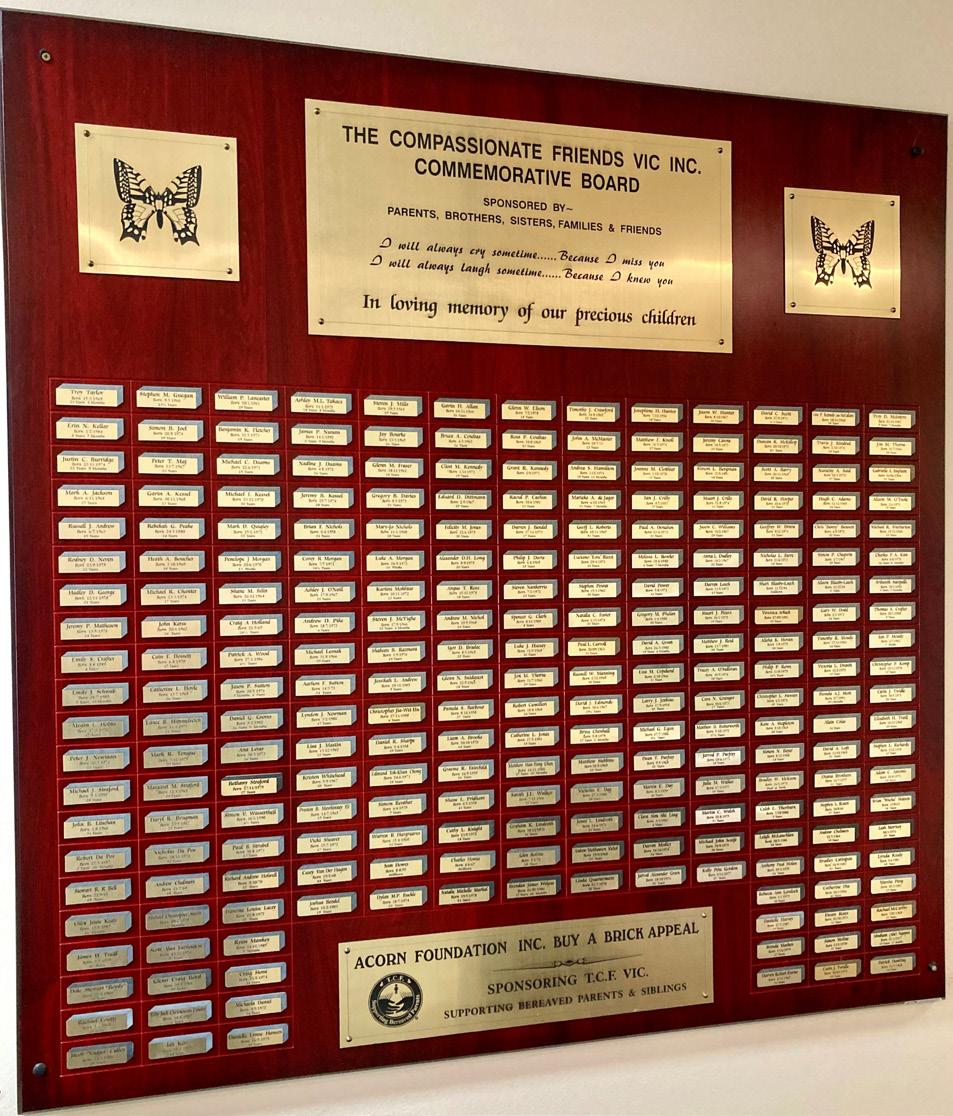
For so many of us, The Compassionate Friends Victoria Centre in Canterbury isn’t just a building, it’s where we’ve cried, shared stories, sat in silence, and spoken our loved one’s name out loud without fear of judgment. It’s where we’ve felt understood. Where we’ve felt less alone.
This place holds the love and the grief of thousands of families who have walked through its doors. And now, we have the chance to make it truly ours, forever.
After years of being in temporary spaces, we finally have a permanent Centre, but we’re still working towards full ownership, to ensure it remains a safe haven for every bereaved parent, sibling and grandparent who will need it in the years to come.
Our Buy a Brick appeal is a chance to be part of that legacy. For $110, you can purchase a brick that includes a brass plaque engraved with your loved one’s name and age.
Each plaque is placed on the memorial wall inside the Centre, a tribute in a place that holds so many precious memories.
To purchase a brick, visit: Lasting Memorials for Lost and Loved – Buy a Brick | Compassionate Friends Victoria
You might choose to mark a birthday or anniversary, or to purchase a brick simply because you want their name to be seen and remembered.
You’re welcome to purchase more than one brick, as each one tells a story. Each one helps hold up a space that has held so many of us.
Thank you for being part of this community and for helping us make sure this home of compassion and connection lasts well into the future.
With thanks,
The Compassionate Friends Victoria Team
P.S. A brick can also be gifted by family or friends who want to honour your loved one alongside you. It’s a beautiful way to say: They are not forgotten.
‘We
how I survived the loss of my teenage son
By: Thomas Harding
Seven years ago, my 14-year-old son, Kadian, was killed in a road accident. This is the advice I’d give myself back then.
When I was asked recently to speak about my “grief journey” to a group of bereaved parents, my first reaction was that it wasn’t such a good idea. I was very worried that it would trigger something in me. Because seven years ago, I watched my 14-year-old son Kadian ride down a hill on a bicycle, and into a road where he was struck by a truck. He died in front of me.
I was also anxious about making generalisations – after all, everyone’s experience is different. There is no blueprint or boilerplate for how to cope with such a calamity. I didn’t want to cause anyone additional pain.
I decided to take a pass.
Later, I took my dog out for a walk in the hills behind our house. And there, up in the yew tree forest, I thought some more. What if I had heard someone speak on this subject seven years ago? What would I have liked them to say? What would have made a difference to me back then?
So, here is what I came up with.
The first thing I would say to my seven-year-younger-self is this: I am so sorry for your loss. I am so, so sorry for your loss.
There are some people who will struggle to say this. Who will be awkward and embarrassed and overwhelmed. But not me. Plain and simple, this is a catastrophe. It is horrible. Terrible. Disgusting. Awful. Life-changing and unfair. I am truly sorry.
The second thing I want to say is that I am still here. Seven years later. Still breathing. Still standing. Still talking. There is a future ahead. I didn’t always see it that way.
One of the worst moments for me happened after I had just seen the ambulance take Kadian’s body away. I found myself in a car on my way back to my parents’ house, where my daughter Sam was waiting. She was 13, and I had to tell her about her brother. That he was dead. It was an impossible task.
When I told her, Sam collapsed to the floor. I held her. We cried together for a long while. And then she said something that had an immediate impact and has stuck with me ever since. “We must live every moment to the full,” she said, “because Kadian can’t.” And so I made the commitment, then and there, to live every moment to the full. It’s been a guiding light for me.
Then there was Graham, our neighbour, who had lost his teenage son in India four years earlier. I asked him how he was doing, and he said that he was “accommodating” to it. I thought about this a lot. Accommodating. Not getting over, or moving beyond, or turning the page – all of which sounded wrong to me, almost disloyal. But accommodating. It sounded strange to say, but it felt right.
A few days later, I saw a tree growing in a hedgerow near our house. I looked closer at its large roots, extending down around an enormous boulder and into the ground. And this is what I realised Graham meant by accommodating. The large boulder lies there for ever, cold, inert; but somehow the tree had found a way to build a life around it.
And so we began to rebuild our lives around this awful event. And one of the first things I learned was that our son’s death had changed the key relationships around us. This was both unexpected and unnerving. The profound trauma and shock amplified our existing relationships, so those that were good were now great, and those that were not so good were now appalling.
Fortunately, my sister Amanda had said something just after we lost Kadian: “You have permission to do anything that makes your life better.” This get-out-of-jail-free card was incredibly helpful. Whereas in the past I might have worried about hurting someone’s feelings, now when my wife and I made decisions, our only concern was how it would protect us and our daughter. As a result, we avoided those family and friends whom we now found toxic. Seven years later, we have reconnected with some of them, but the relationships are different, more shallow, more managed. Most we have not. And that’s OK.
For a while I was mad. I cried a lot. So did my wife. One breakfast, our daughter asked us if we could try to limit the crying hours, perhaps to daylight hours. She said it so nicely that we laughed. Mostly we succeeded.
At first, my wife and I tried to do everything together. It felt safer. I could take care of her, she could take care of me. And then we realised that this was actually making things worse, that we had different needs at different times. This was a big moment for us. To keep our sanity, we had to walk the journey close, but separate.
Such strategies helped, but still I was unable to avoid the triggers that kept on coming: seeing Kadian’s body in hospital; receiving his death notice; reading a sensational headline in the newspaper; shutting down his mobile phone account; going out for dinner and then seeing the fourth chair empty; attending a family occasion where all the grandchildren were there, but him. Each time feels like a punch to the stomach, like being told for the first time that our son had died.
And then there was that awful question, which came up in conversation when I met strangers: how many children do you have? At first I said, “Two”. Then I was asked their ages. I would pause and give Sam’s age – 13, then 14, then 15, now 20. Then I would say that we also have Kadian. He was aged 14 – when he died. And this almost always exploded the conversation. Typically, people would not know what to say. Most changed the subject, some even turned away. A few would be curious. How did he die, they would ask? Or the real shocker: was he wearing a bicycle helmet? Why did they ask this? Did they want to establish guilt? Of course he was wearing a helmet.
For a while I told people I had one child, but it felt so unbelievably disloyal that I stopped almost at once. Now I give a limited amount of information, and if the inquiry moves in a direction I wish to avoid, I simply say, “I do not wish to talk about that,” and move the conversation gently on.
But there’s another question people ask: how are you and your wife doing? I know where it’s coming from, because one or two people went further and mentioned a statistic that the stress of losing a child leads to breakups. At first, I responded with anger. How dare they challenge my marriage, which I rely on every day just to get by? Then I found numerous studies that undermined the bogus child-bereavement-leads-to-marriage-breakups claim and quoted these at anyone who dared bring the subject up. But I quickly realised that the questioners just looked at me as if I were crazy, which I was. Now, when people ask, I keep it simple. My marriage to Debora was always strong. We met when I was 18 and she was 23. But the death of our son has brought us even closer. I loved my wife before Kadian died. I love her even more after.
A few weeks after we lost Kadian, my instinct was to go back to work, to keep busy, to distract myself, and so that’s what I did. I helped a friend with his book-keeping and ran a real estate brokerage. At the same time, I had just sold my first book to a publisher and was about to start a round of edits. I hoped that by trying to return to some semblance of normality, it might give me comfort in a world that had become, overnight, abnormal, uncontrollable and unreliable. But I found there were some things I could do and others I could not. I learned that I could not deal with people. I responded badly to tension and conflict. Any problem, however minor, triggered a massive anxiety attack.
So I gave up everything except my writing, which suited me fine. I was by myself, working in a safe environment that I could control. My wife also found that she could no longer stay in her job. Between us we had lost 80% of our income. Before long, not only were we having to deal with the traumatic loss of our son, the emotional impact on our daughter, PTSD and social alienation, but also the real prospect of losing our house. So, what would I tell my seven-year-younger self about this? I certainly would not deny how hard it is. Nor would I say, everything’s going to be fine – because it is not. But I would say, you’ll find a way to get through it. And when you can’t, you will need to find people who will help. Which in my case is a hard sell, for I am not someone who finds it easy to ask for help. But sometimes you have no choice. So I would tell myself to get over my pride. And that it’s OK to borrow money if you need to – you will find a way to pay it back. And that those people who love you will want to help you if they can.
‘We keep him close, always’: how I survived the loss of my teenage son continued
I would also say that it’s OK to lie on the couch and watch TV, if that’s what makes you feel better. And I would tell myself, it’s fine to drink whisky. But I would add, be careful. Try not to drink too much. If it doesn’t make you aggressive or depressed, and doesn’t give you a headache the next day, fair enough – but still, watch out.
And I’d also say, at some point you may want to speak to a therapist. But give yourself permission to say that this person is not the right fit. Because a therapist is like a girlfriend or boyfriend – the chemistry has to be right. And when it is right, listen to them.
Even then, it’s not easy. It wasn’t easy when my therapist said I should consider taking medication. “I’m not that kind of person,” I said. “What kind of person is that?” my therapist asked, kindly. “Well, someone who is broken, traumatised, grieving, lethargic, unable to perform basic functions, lying on the couch all day watching box sets, drinking too much whisky.” And of course, I realised I was that kind of person. So I took the pills, and this helped me get through. Until it was time to come off, which I did, slowly and carefully, and again with help. And now I’m not on them, though I still like watching box sets. I still give myself permission to take time out when I need it, because sometimes the world’s just too much.
And then I would say to seven-year-younger-self: enough of all that. Please tell me about Kadian. Because that’s one of the ways to keep him close. So here’s a story about Kadian…
Two months after he died, his art teacher came to our house, holding a bag. She explained that Kadian had been working for weeks in pottery class on a project. He was going to give it to me for my birthday. It was a white ceramic cube with a pedestal inside, which was turned by a stiff crank. Above the top was carved his favourite slogan from Apple: “Think different”. There was so much about this that was Kadian: generous, inventive, creative, artful, thoughtful, kind.
He and I had recently painted his bedroom silver in honour of Apple, which had been a wonderful father-son time. We laughed a lot, our faces and arms covered with silver paint. And now here was this object, magically arriving at our door. Impossibly arriving, after he was no longer here. Because though Kadian is gone, he is still very much here, at least in part.
How do we keep him with us? We tell stories about him to our friends and keep pictures of him around the house. Each year we take his birthday off and go for a walk. Each summer, we go camping with friends and family, eat good food and drink good drink and melt marshmallows over the fire and fly kites and remember Kadian as we go. We keep him close. Always.
And though we grow older, and he died at 14, somehow he is ageing with us. Of course, he is not here, and to tell you otherwise would be a lie. More than anything, I don’t want to lie. I say again, his death is, was, will be terrible. So, my dear younger self, my hurting, confused, troubled, broken me. If you can, try to be grateful for your time together. Be angry, truly angry, for what you have lost. Shout at the sky. Smash some plates. Scream at the world. Why would you not? But remember the good times. The laughs, the hugs, the moments of joy. The special, private moments that only you know. Write them down if you can. Or talk about them with people who also remember. Or sing or paint them or find another way. For he was magic, and in your life. Not for long enough, that’s for sure. But if you can, be grateful.
The moments will pass. They will become hours, then days, then weeks and years. Your dear, darling, beautiful child will still be missing. Not here. But also, somehow, here, too. And in front of you, let’s hope, will stretch the next seven years, and perhaps the next. So try and do what Sam said: live each day to the full. Because you can. This article is adapted from a speech given at the 50th anniversary conference of The Compassionate Friends UK. Thomas Harding’s book, Kadian Journal, is published by Penguin Random House.
The story behind this picture of a heart painted on a little wooden box.
‘Echoes of Love’ is the name I gave this box when a dear friend, Carlo – who was a big part of my formative years when I lived in Florence during my youth - recently asked if anyone wanted it. Carlo built and painted the little house-shaped box in 1999, and years later during a period in which he suffered a crisis, placed it in a forest in Tuscany, hoping it would become a sanctuary for small woodland creatures and insects. There it stayed year after year, as it was welcomed and adopted as a haven by the forest’s little inhabitants, as Carlo had hoped. During its forest sojourn, their little home had survived the scorching summer sun, icy winters, storms, gale force winds and anything mother nature could throw at it. Battered, broken, wrinkled and etched by nature, it looked even more beautiful than its original birth... and I identified. Weathered and bruised, like us, it had survived.
When I said, “I would love to have it Carlo, because the heart is so significant to me … it is the language I use when I speak to my beloved son. But I am living in the antipodes!” he responded, “Laura, it’s yours. One day if you come to Italy, you can take it home with you, but from today I dedicate it to Alex. Please give it a name to give it life.”
I was overwhelmed by this precious gift. I dedicate this box with its painted heart that echoes the central common denominator of what makes us breathe...
Love. Echoes of all our hearts that beat as one with our children. Echoes of Love.
Laura Tomei
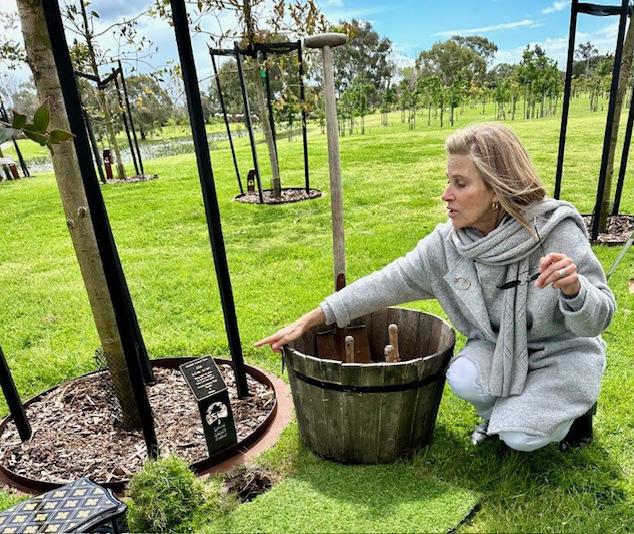
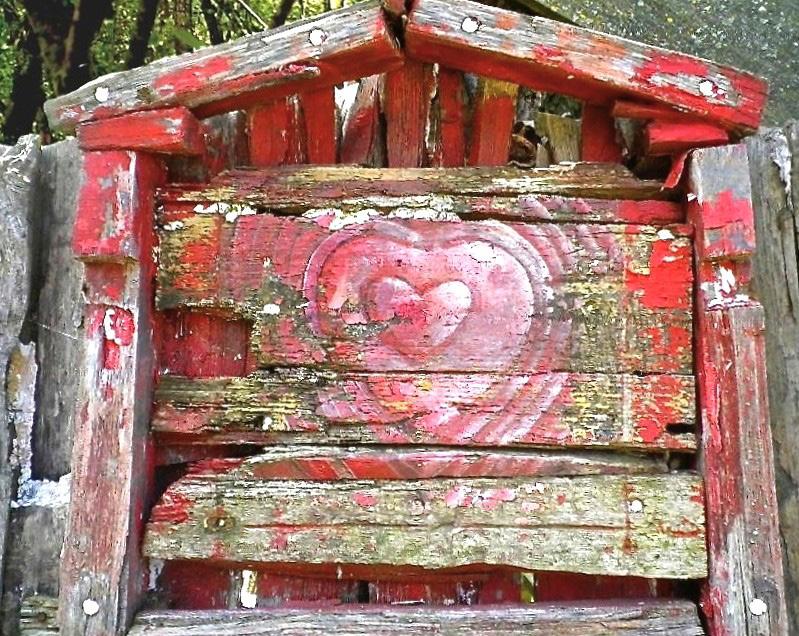

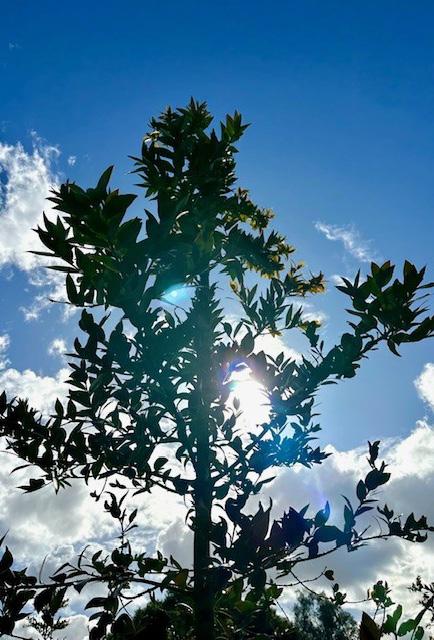
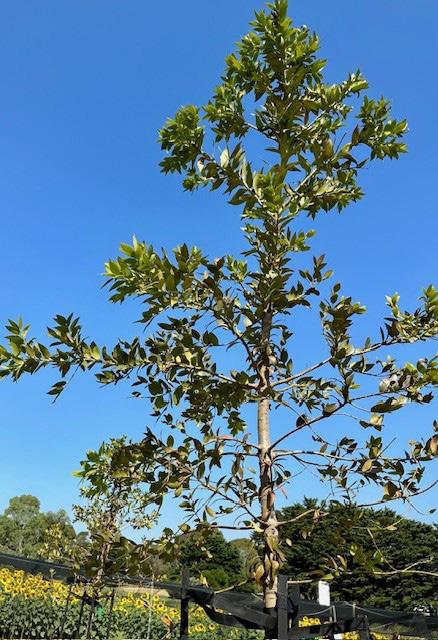
I recently read through some things I wrote after my sister died. It’s a hard read. Although you don’t forget how you felt in the past, sometimes the intensity of those feelings diminishes, and you do then forget how much you felt something at the time.
Here is an extract from something I wrote in March 2020.
“It’s been 6 months today since my sister died. 6 months. The pain feels like it has been overwhelming me for 6 years, not 6 months. Yet, when I think of my sister, it feels like no more than a couple of months since those last weeks.
I suspect that society feels like I should have moved on by now. Got over it, or at least worked out a way to move forward by now (not that anyone has said that to me, but I don’t really show my grief, so no-one has had the need to say anything to me).
Even I sort of had that expectation myself.
But I haven’t.
In many ways it actually feels worse now than it did 6 months ago (but I hate to say that to anyone who may be at the beginning of this journey!). I honestly felt numb for the first 2 months, even 4 months in I was still in disbelief. I think perhaps because my sister was so sick for so long, yet kept living, it actually made it so much harder to believe she really did die. In those first months I was hurting but I was so busy planning and organising everything, and then Christmas and the kids’ birthdays hit and you know, life goes on, you have to keep moving.
But I was still hurting.
Then the kids started school and kinder and I felt a whole new wave of grief hit me. This time anxiety came with it. It was building over months but I didn’t really recognise it. I was in survival mode. For some reason, my barriers dropped, and my anxiety peaked. It just seemed to buzz in the background for a while, but then it jumped at me in bursts and I nearly drowned. I was anxious about anything and everything, especially death – other loved ones dying or myself.
I started counselling, tried some meds, tried reading and writing. Tried talking sense into myself.”
Now well into 2025, I have now been feeling the pain for (almost) 6 years, but it doesn’t feel like it did at 6 months. It doesn’t feel like it is overwhelming me now, I don’t feel like I am drowning. Some things haven’t changed at all – I still miss my sister enormously; I can still picture her and feel her and hear her voice. When I think of her last weeks, it still feels like only a few months ago at the most – every moment etched into my mind so clearly. There are still moments that leave me breathless, some thoughts that stab at my heart, feelings that intensely wash over me.
But the anxiety. I had almost forgotten about that! Which seems astounding, considering how all-consuming it was at the time. It had such a huge impact on my everyday life. It crippled me.
What happened to it?! I struggled so badly with anxiety for maybe 2 or 3 years? I’m not really even sure when it eased up to be honest. Things must have just slowly improved until I found a new normal and the anxiety dropped off. Life got in the way of it, instead of it getting in the way of life. I guess it must have been gradual, not a huge, significant moment. The same way it started I suppose.
The grief is still there; it always will be. I know that. I don’t fight that, as the grief is the proof of my love for my sister, it reminds me that our bond can’t ever break, it was real, she was real. But I am grateful that the anxiety didn’t stick around. I wish I could share some wisdom with anyone else who finds themselves struggling with anxiety after losing a loved one, but I don’t really know how I got through it, or why it went away in the end. Perhaps it just ran its course? It’s very hard for the body and mind to stay at a heightened level long-term. I think many people learnt about that through Covid lockdowns – you can only stay super-vigilant for so long before complacency creeps in.
So perhaps all I can share is that one certainty in life is change – many things can and will change. Sometimes without us even knowing when or how, they just change. That knowledge gives me hope. Even the darkest feelings, the hardest, heaviest moments, they can change, they can shift and lift, the lighter spaces between them can lengthen and grow, until one day we no longer feel so overwhelmed by the pain every moment of every day.
Time didn’t heal, I haven’t gotten over it, I haven’t forgotten my big sister. Life just keeps moving and I’m moving with it, I’m changing and I’m better at coping with the enormity of the loss now, so it doesn’t overwhelm me like it did earlier on.
And I know my sister would be proud of me. Not just for being happy (and for leaving that anxiety behind me somewhere!), but also for letting myself still be incredibly sad.
Johanna Cahill
forever Penny’s little sister

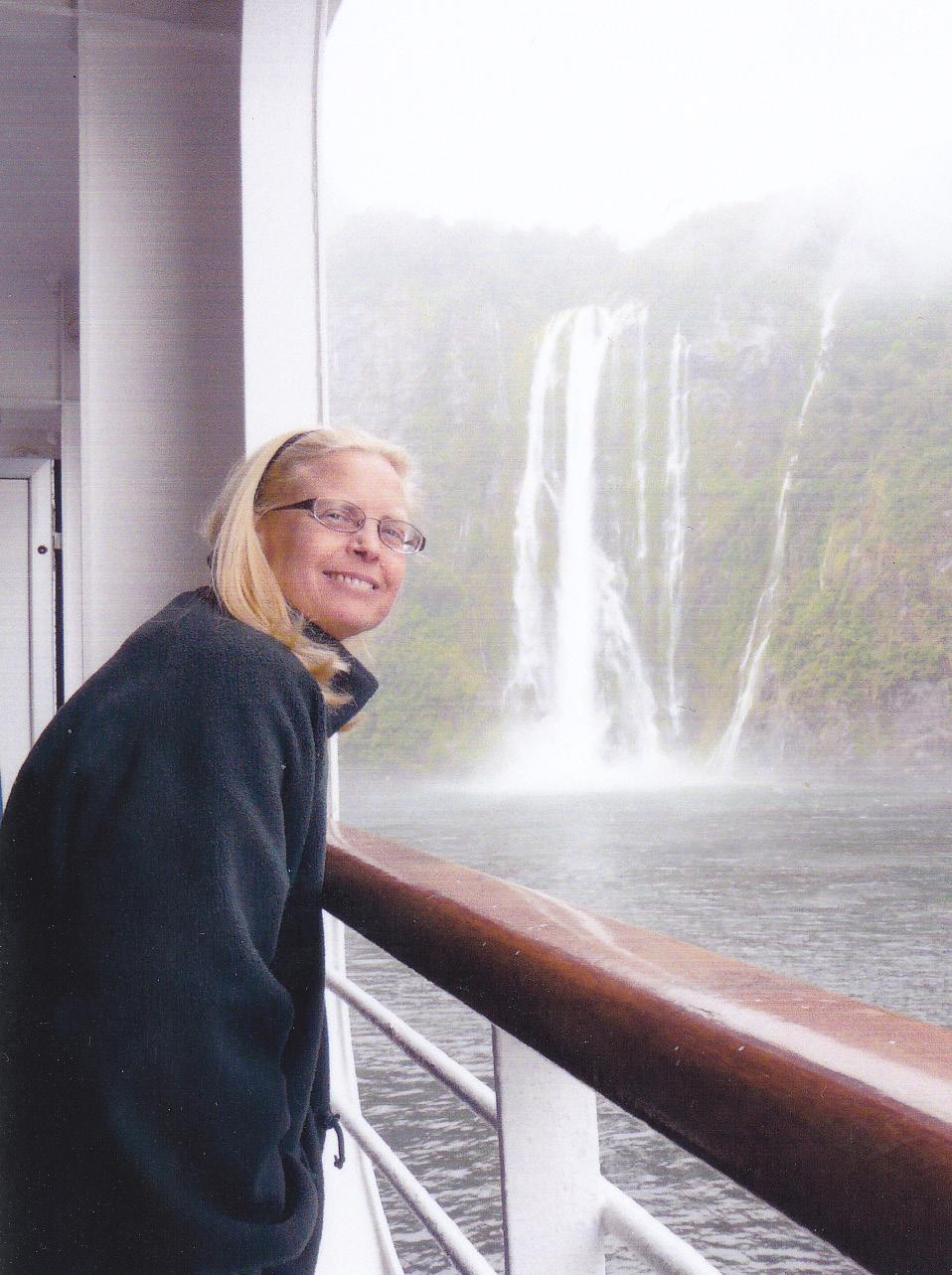
First, a few words from Shakespeare: Give sorrow words; the grief that does not speak knits up the o-er wrought heart and bids it break. Grief makes one hour ten.
A few days ago, my wife Pip and I were sitting on the back steps of the house, soaking up the rays of the spring sun. The warmth was settling into our bones, but we both knew and felt what the presage of this seasonal greeting meant. It’s become intuitive this knowing, like an osmosis of love and loss into what the other is feeling at this time of year. Soon, it will be October.
Some days, we say, we wake up and think that he is not dead. This thought is but a sliver of light from an alternative universe that comes in through a chink in the mind and heart. Time is playing tricks. Like this one, too: How can it have been five years without him? And yet, it is. One night in mid-October five years ago, Hamish died. He was 21.
Some days, this thought of unreality opens the front door of our hearts, enters quietly, doesn’t make a sound and sits with us. Surely, time cannot move so fast. Surely, it cannot be in two places at the one time, both a blink of the eye and forever. And yet here I sit typing these words in the moment that is the blink of an eye and forever. In five years the world has moved on: wars begun, wars continued, political leaders and governments come and gone, grand finals won and lost. We are older.
In these weeks, the grief that swells and falls like the tide, the absence, begins to open up. My chest then holds an ocean of infinity, from nothingness to eternity, rising and falling with each breath. After five years, the movement is slower, more gradual, the sharp piercing has gone, mostly.
In the first raw months after Hamish’s death, I charted the shape of grief, its contours and shadows. I have since written thousands of words in prose and poetry on the grief that fell crashing onto the shoulders and then burnt into the heart from that day in October.
At first, I was just trying to keep Hamish’s name alive in the world. Readers, I could not stop. As the world kept spinning, so the words flowed like a river to the sea. I self-published two books on the writings to hold all the words together, to moor them to the one port. One is called The Ocean. The other, The Centre of Zero. Publications were kind enough to run part of both the prose and poetry. There were kind reviews that followed. I received letters and emails from people I knew, friends, colleagues past and present, people with whom my work had enabled contact, and from strangers. All were a comfort beyond measure. The overwhelming feeling was that people are kind. It’s an act that is too often drowned out in the cacophony of these shrieking, manic times. But, people are kind. This I know.
The grief of Hamish’s death shaped the words and, slowly, the words shaped the grief. Both shifted a gear in me, and in how the world is viewed. This is natural when an axis is tilted. Some look to grief to be healed, but this, to me, for me, is the wrong word. You may be scarred, deeply, but you are not of a disease, you
are not sick. For mine, the words over the past 60 months have become a sculpture of sorrow, solace and discovery. The latter is in finding what the depth of love looks and feels like when it is taken from you.
Grief had begun life as the enemy, the tormentor of the soul, the cruel artist who coloured every scene of the world, who was the constant companion of what had ceased to exist. But after five years, the shape of grief has changed. A friend and colleague told me recently of a friend she knew who had also lost someone. I said, grief can be a friend. I had never thought or said that before. It just rose. A friend because it only arises when someone you love is no longer with you to be loved. You only grieve if you have loved and lost. The deeper the love, the deeper the grief. It’s a tributary from the dam of the breaking heart.
This, of course, is only my path through the past five years. It’s not a map, but an atlas only of my world that now has marked on it ‘the undiscovered country, from whose bourn no traveller returns’ (also Shakespeare).
And every now and again a poem arises into the still air ...
Counting backwards, counting forwards the heartbeats of the day casting them to the air see if they float differently, catching light and wind holding my breath, not holding my breath for the seconds to become sentences for meaning to form. Counting backwards, counting forwards the dark calculus that shadows the eyes, that turns on the grains of blown sand that speaks to the ash
surely, it can’t be this time for all time – waiting for a silence to break that can’t be broken. Counting backwards, counting forwards forging days into a chain of voices that whispering flow as a hand moves, as eyes flicker in the here and now.
These are the pale numbers that add and take the sum of life from earth to sky. Counting backwards,
Warwick McFadyen is an award-winning journalist. He has won two Walkley Awards and four Quill Awards. He has published several books of poetry. The latest is 21+4 Poems. His prose and poems have also appeared in Quadrant, Overland and Dissent.
Sent in by Barbara Kessel
Bereaved Mother
l found this sketch again recently… It has been 12 years since l did it and 14 years since my son Ben died by suicide. Looking at it again…
• l see and feel - the protection that my body and friends gave me during the period of my inability to comprehend what had happened.
• l see and feel - the indescribable enormity of the pain.
• l see and feel - the forces of life always radiating in the background.
• l see and feel - my looking to the future to find colour and stability again, even though l had no idea what that would look like.
l may do another sketch so l can feel those radiating life forces of kindness and empathy whenever l reach for them, and the colours the earth provides are seen again.
Gaylene Petchell
A tree stood waiting patiently, To show its love is saved for me. Its arms held out to receive me there, Within its wild and tangled hair.
My thoughts were of you
As I wandered by. And of just how much you cared. And I know it was you who was waiting there, With your heart, and your arms and your wild, tangled hair.
So many people have walked by that tree
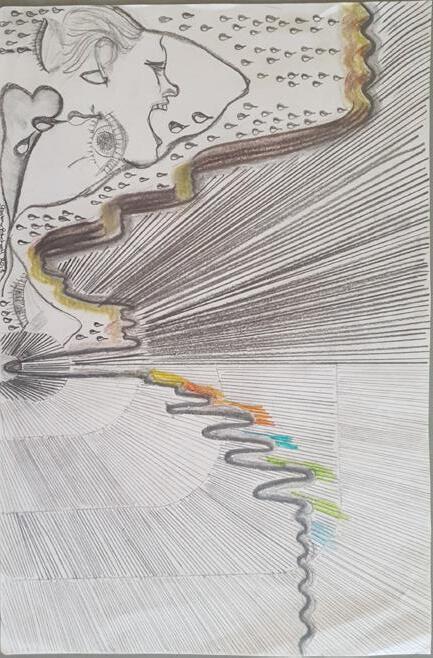
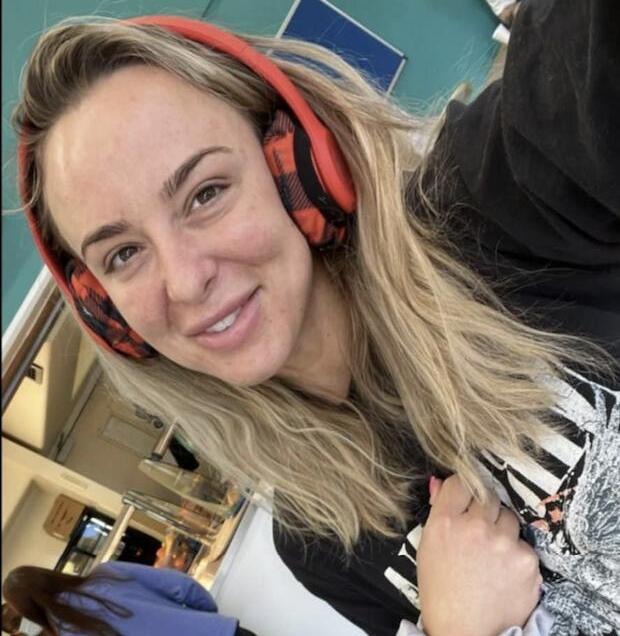
But its love and its message waited just for me. Those arms and that heart saying, “Mum I am here, I will love you forever, I’ll always be near.”
Rhona Hughes Bereaved Mother of Madeline
Today, 26th July 2025, is our son, Steve’s, 52nd birthday, but he will be forever 43. It is also nearly the 9th anniversary of the crash that killed our very innocent son, but also the other driver. It has been a struggle for me to climb out of that very dark place into which I fell when Steve was taken from us all. Over the years I have become immensely grateful to all the amazing people who have supported me. I am grateful to The Compassionate Friends magazine and the Online Art Therapy class which has helped me to focus on and help heal many physically symptoms of distress that had shown up in my body. It helped me to try deep breathing exercises and reflection. It helped me to return to the creative side of my life.
Rosalie
Dows Mother of Steve
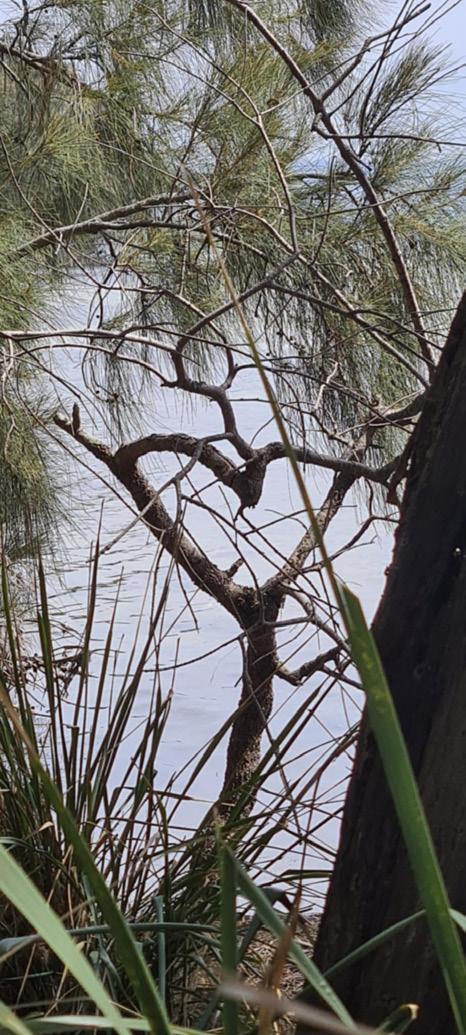
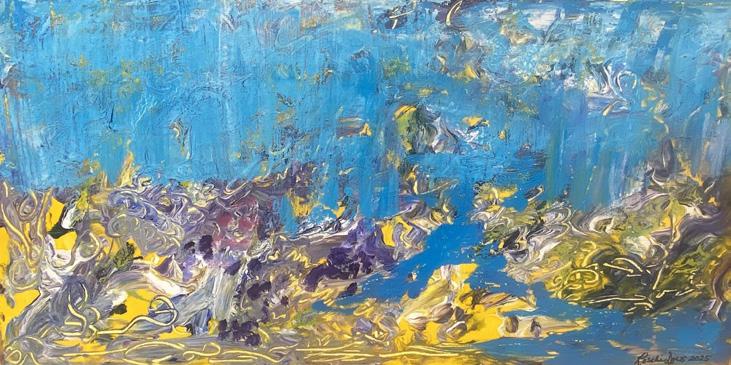

One Saturday morning in July, six of us met at the State Library of Victoria (SLV) to have a coffee, a chat and an explore. We learned a little about each other and then decided to wander separately around some of the treasures on offer at the SLV, and to meet up afterwards to round the jaunt off and say farewell.
The favourite parts of our wanderings around the venue for us were the Treaty exhibition; the iconic Dome in the La Trobe Reading Room; the Sorry tapestry; the “Make believe encounters with misinformation” exhibition; and the “World of the Book” exhibition. Never mind the Children’s Quarter, Ned Kelly’s armour, the picture gallery, the family history collection and the Readings bookshop outlet! It’s a Melbourne gem.
“Whenever I attend a TCFV event, I always leave feeling better.”- Cathy
“It was a very enjoyable few hours with interesting exhibits, very good company and the Guild café was perfect for us to assemble and relax in. It is a place a few of us could just go back to at any time for our own outing.” - Bruce
We also had a little discussion about future destinations for Culture Club, so stay tuned for some interesting events coming up!
Joanna
Durst
TCFV Volunteer
Congratulations to Kevin Purvis, who received the Boroondara Volunteers Award in May 2025 for his many years of dedicated service to TCFV, including his invaluable behind-the-scenes contributions.
Unable to attend the ceremony, I was honoured to accept the award on Kevin’s behalf and share his heartfelt speech, which deeply moved the audience. The event also brought positive attention to TCFV’s work and helped raise community awareness; something Kevin had sincerely hoped for. Thank you, Kevin.
Natasha Ballingall Volunteer Engagement Coordinator
To celebrate Volunteer Week, all TCFV volunteers were invited to a special movie screening in Hawthorn where we enjoyed “Oceans”, the stunning documentary by the brilliant David Attenborough, which gave us all plenty to reflect on and discuss.
The outing included drinks, popcorn or ice creams, and a chance to connect over refreshments afterwards.
It was a wonderful opportunity to recognise and appreciate the incredible contributions of our diverse volunteer team—board members, group leaders, telephone responders, art therapists, and centre volunteers.
Jane Moschetti
TCFV Staff Member & Volunteer

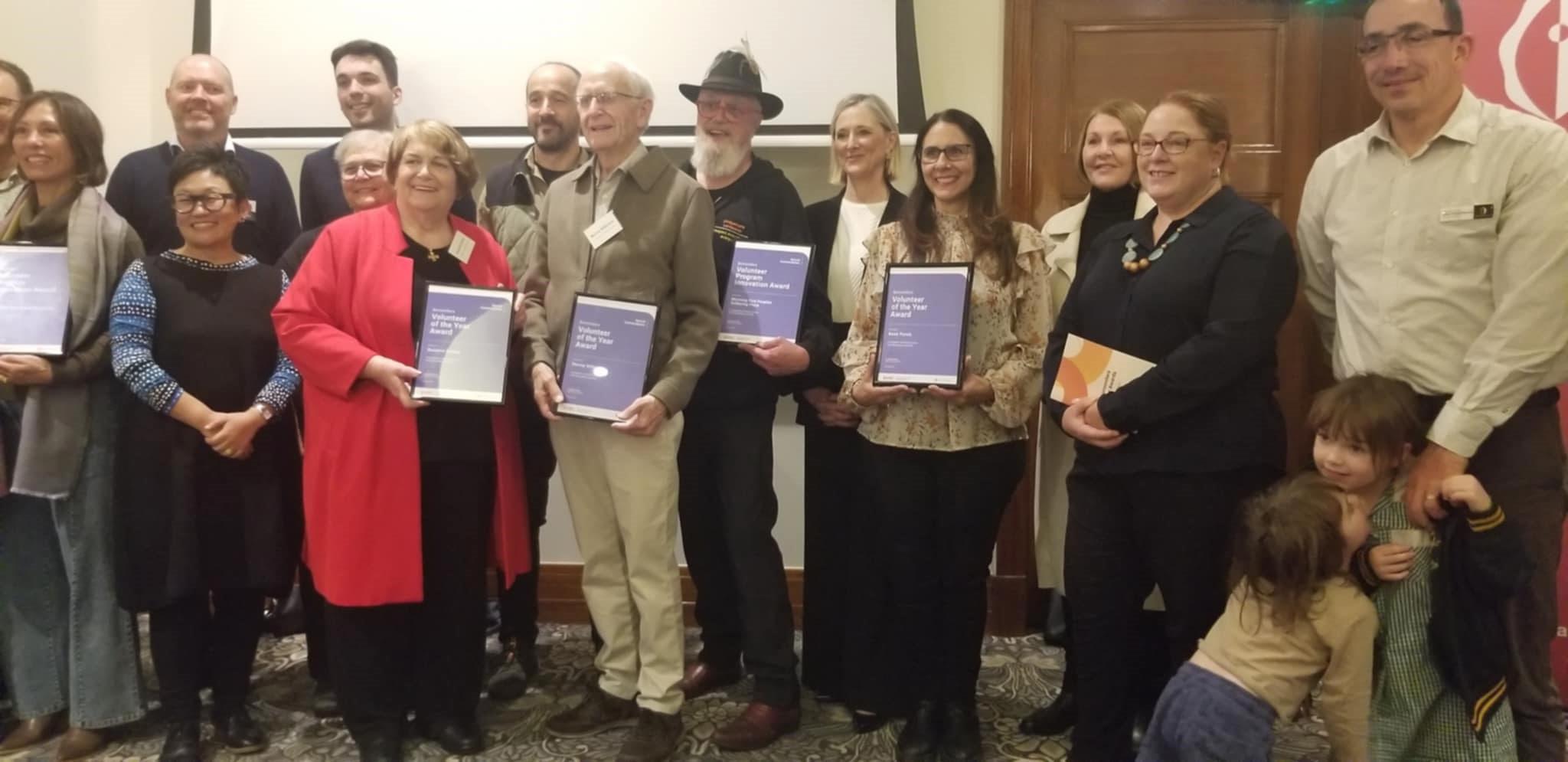
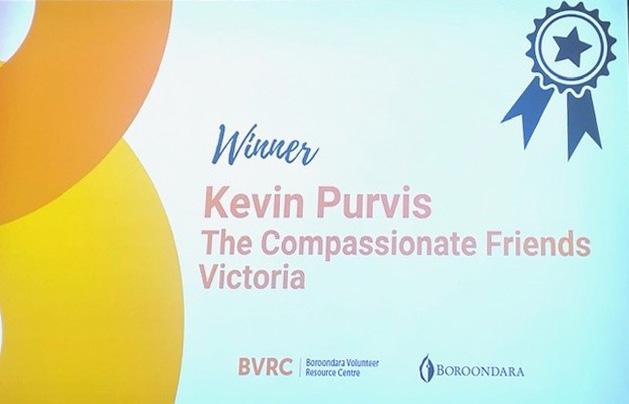
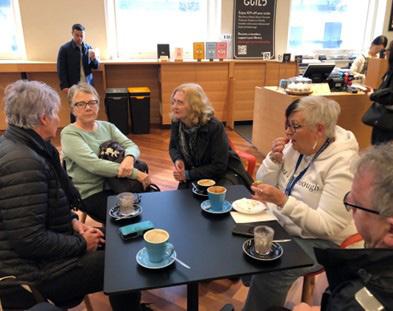

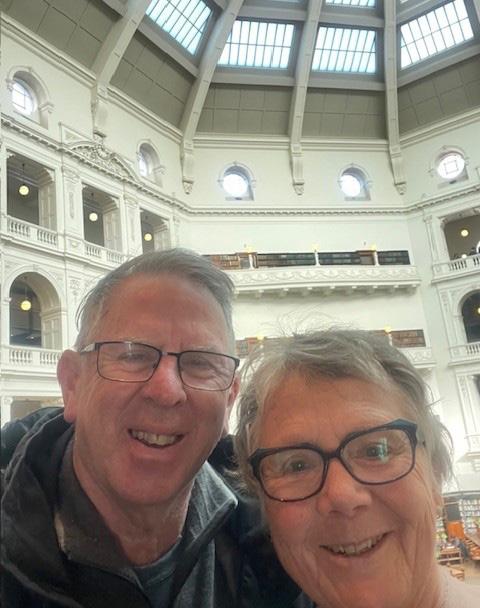
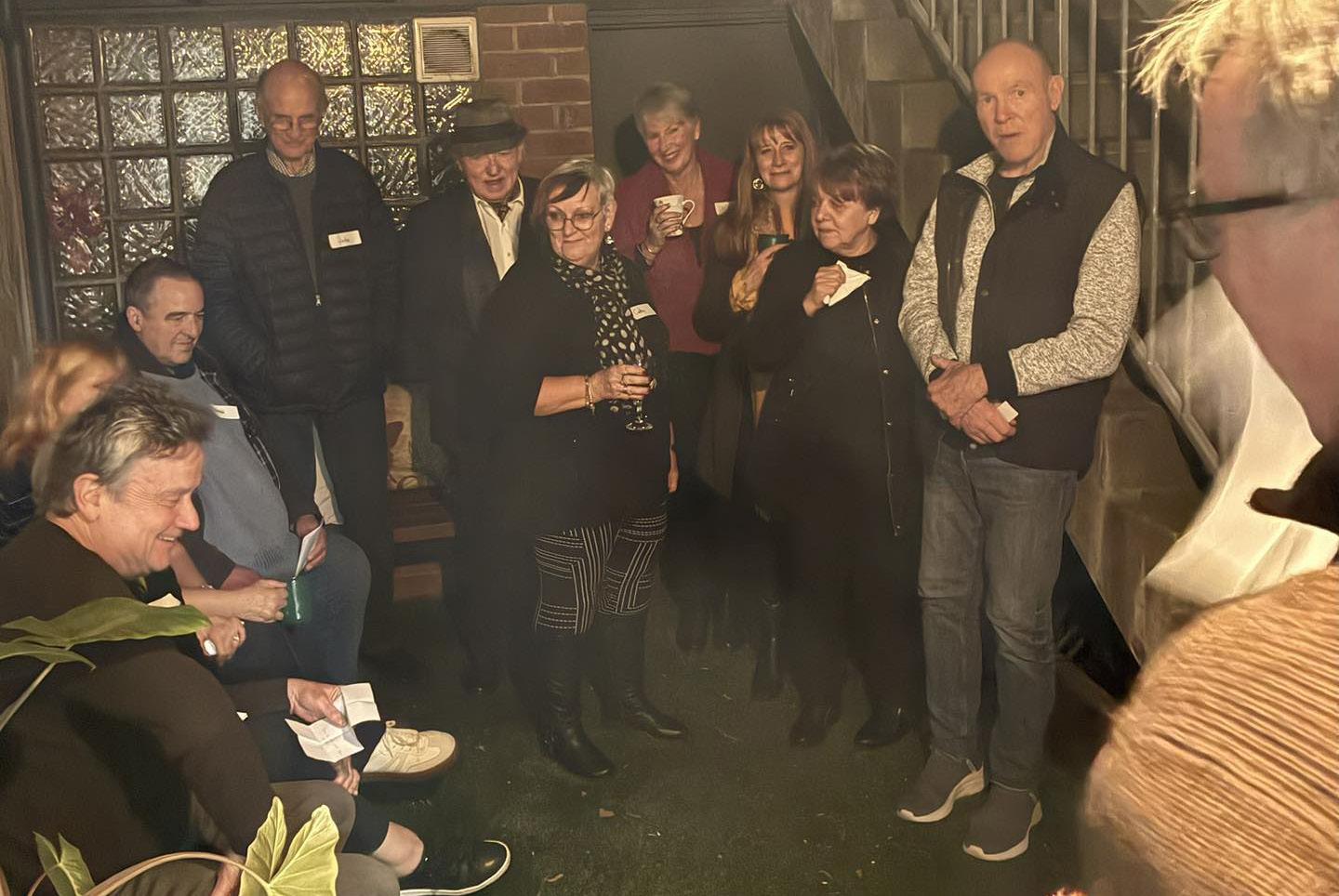
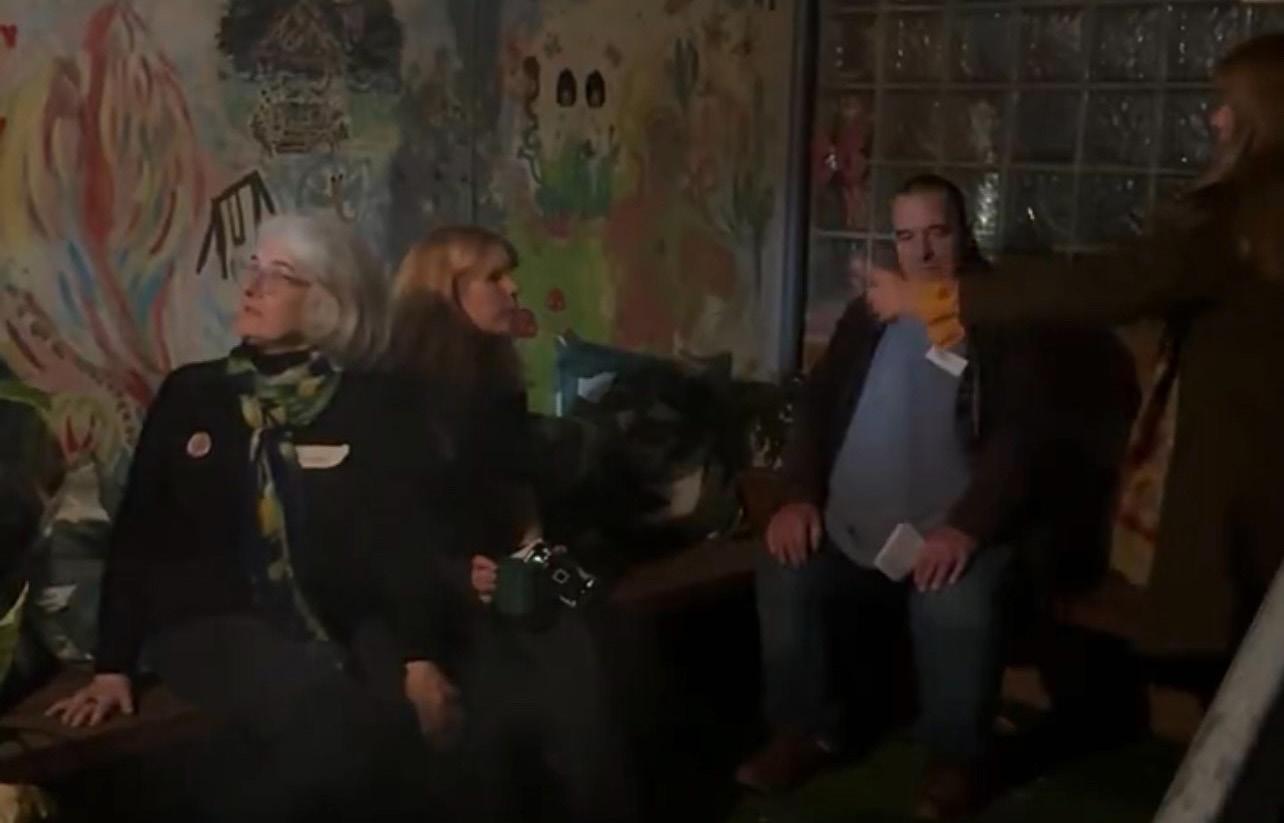
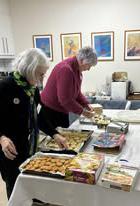


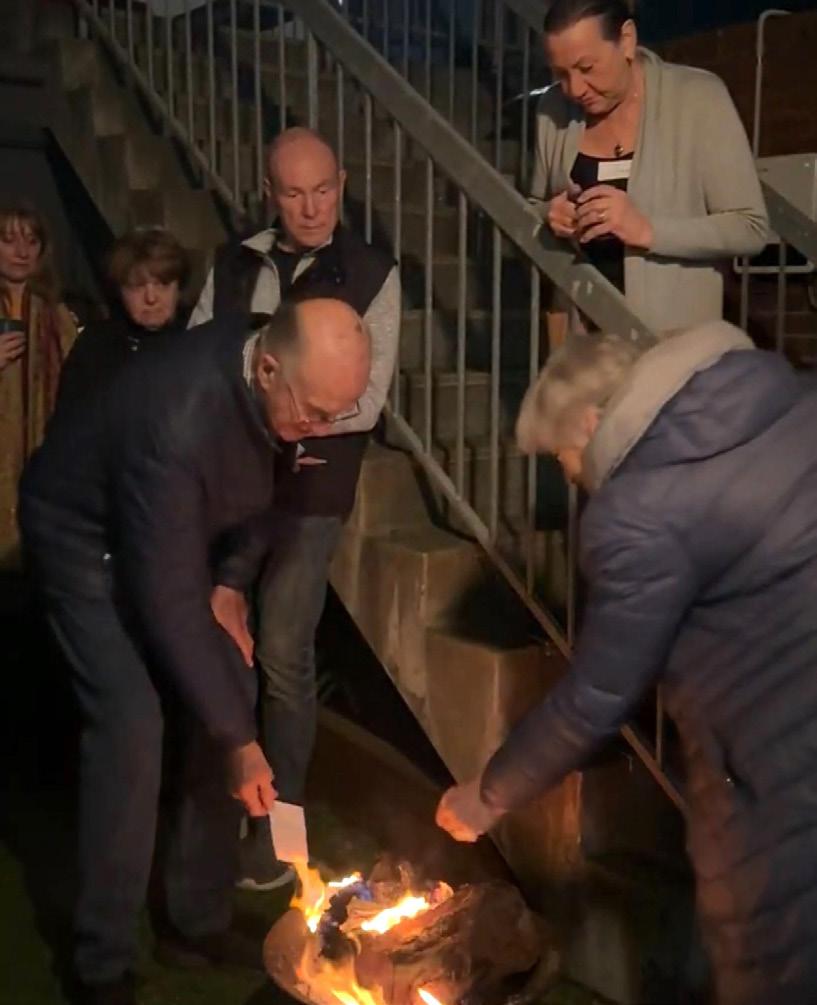

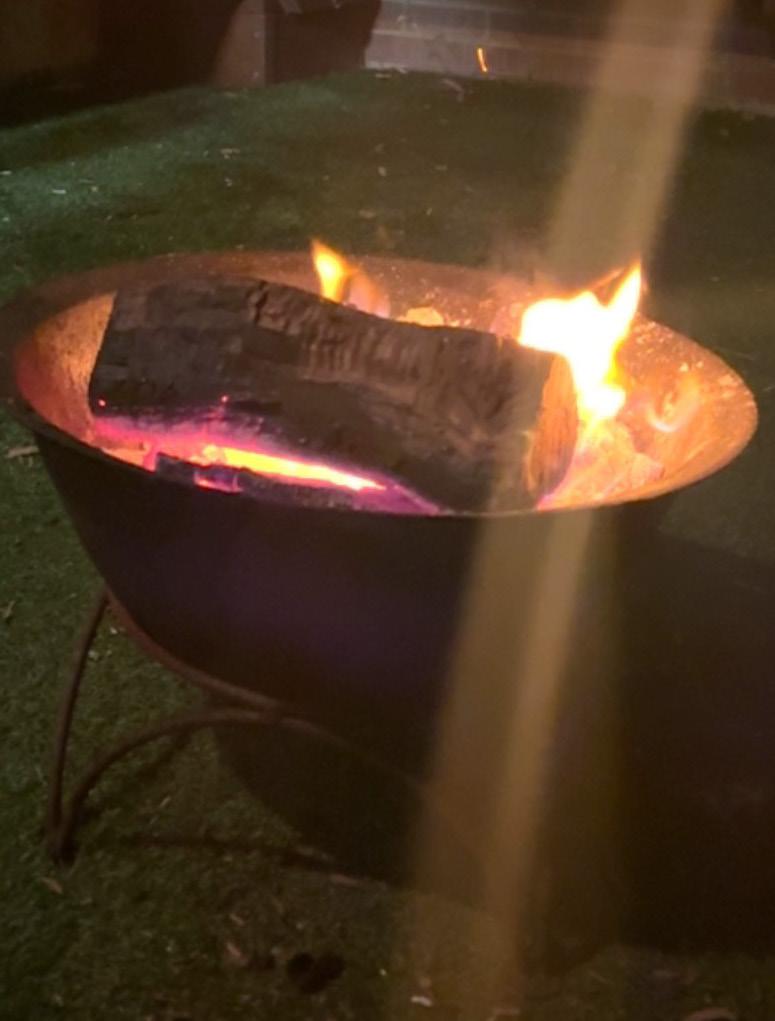

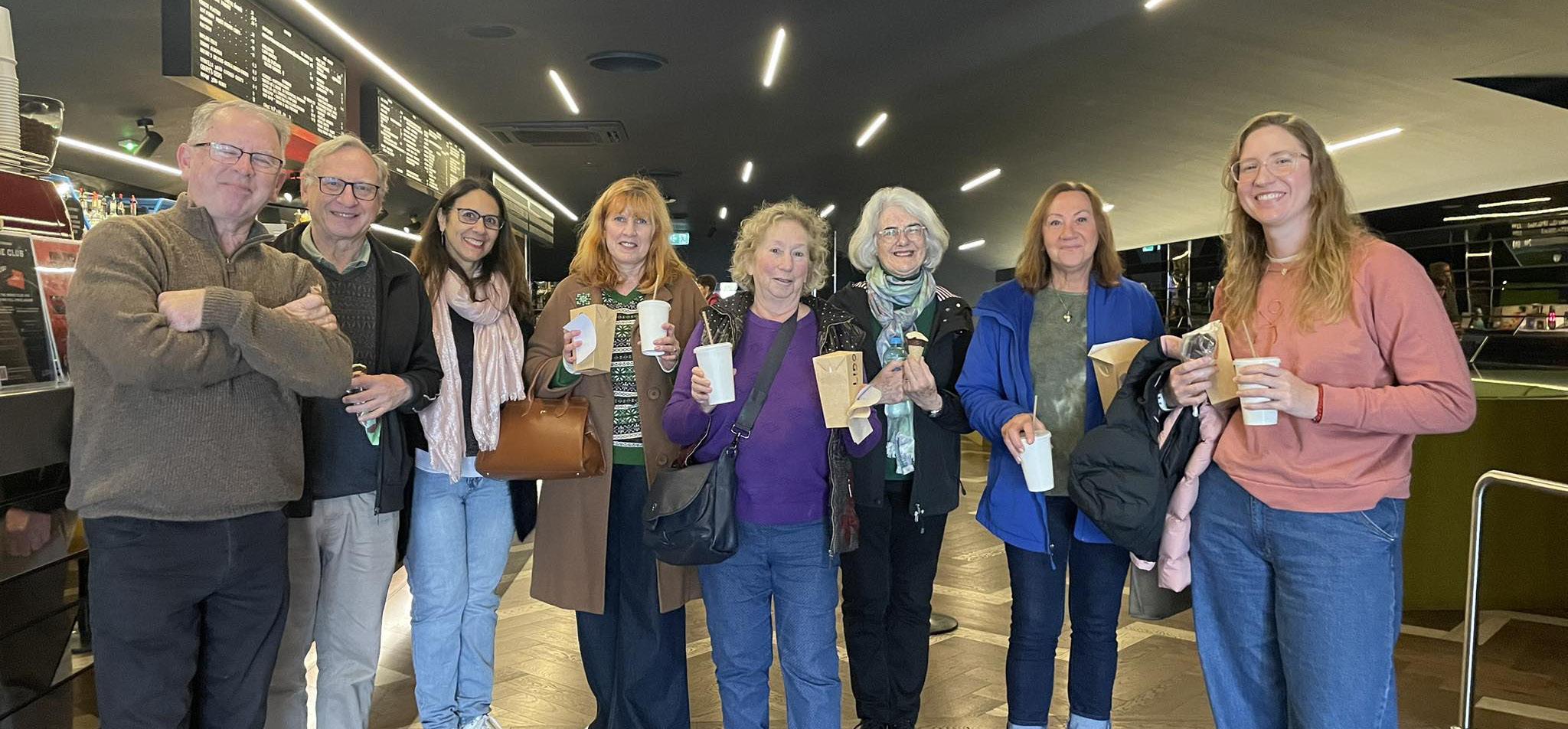
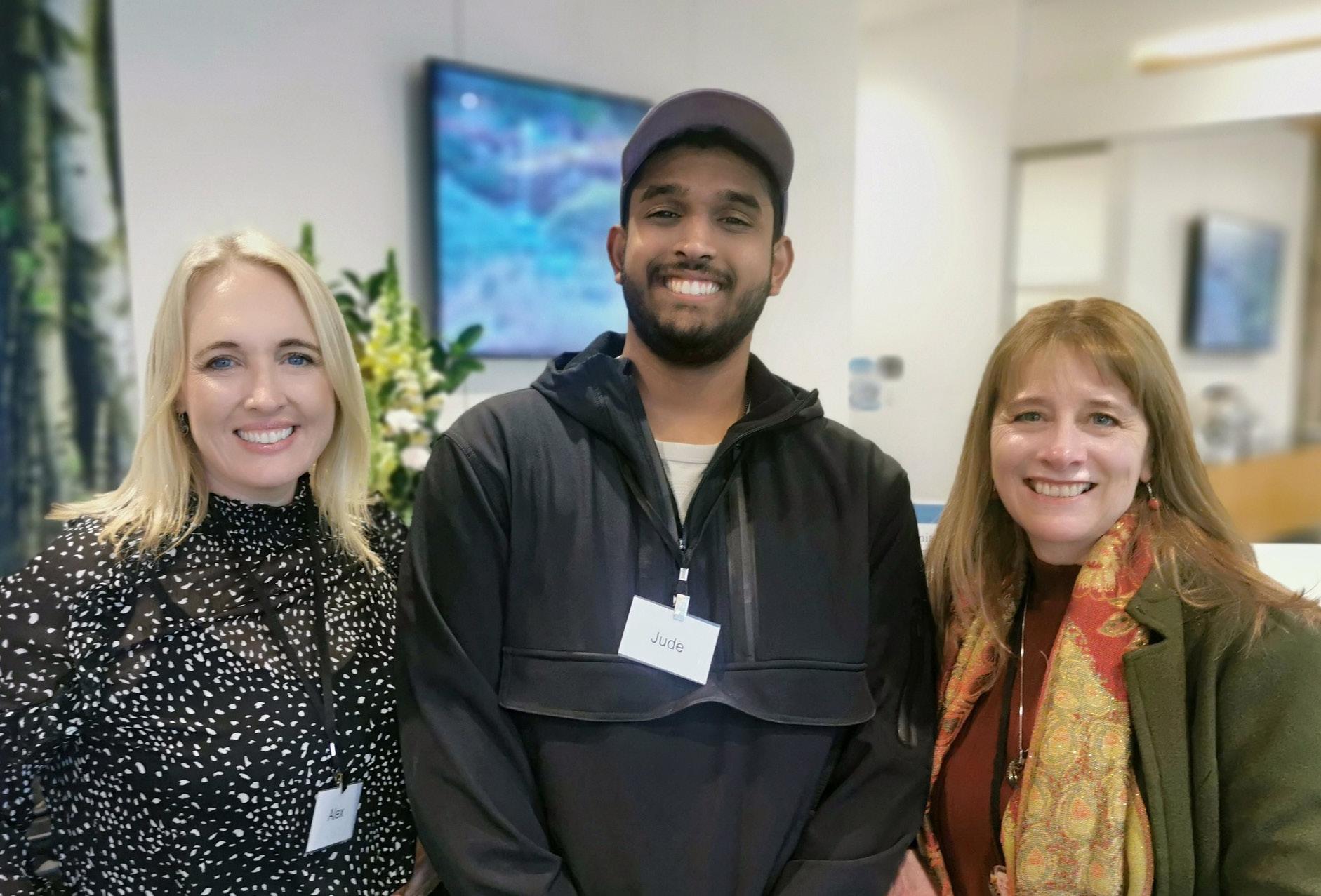

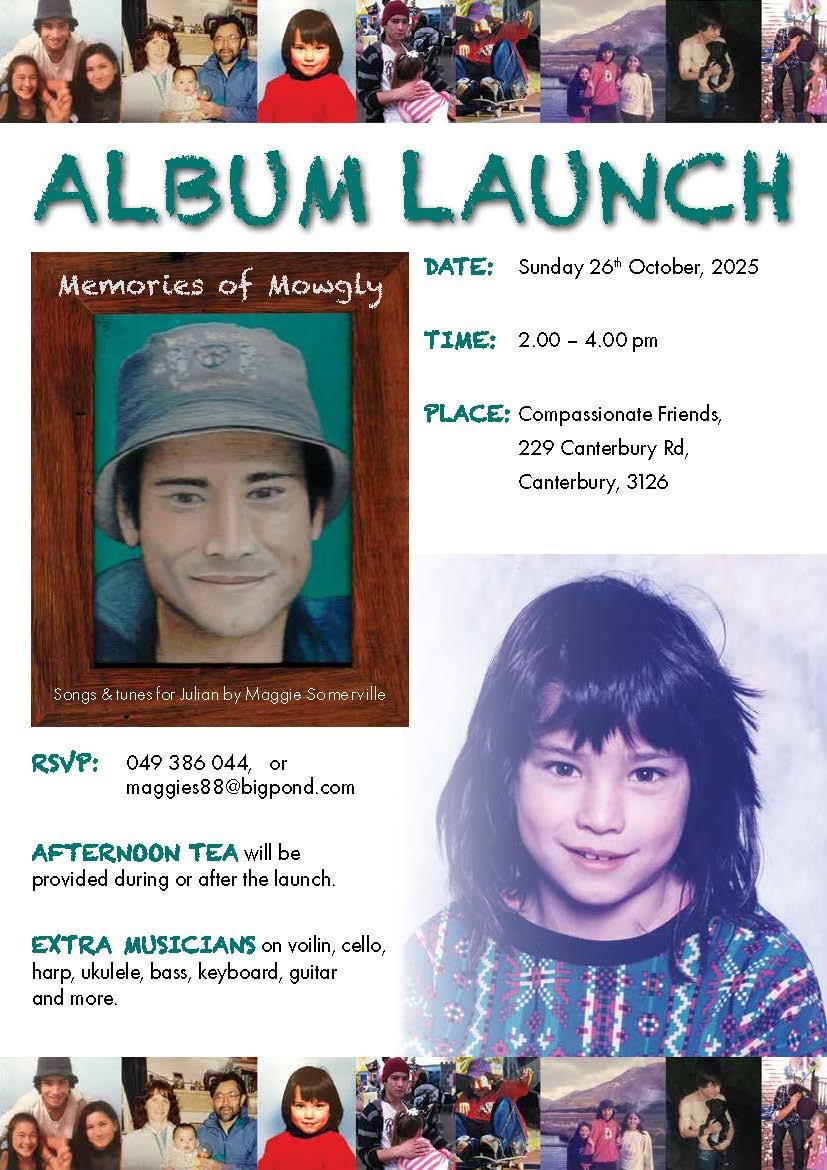


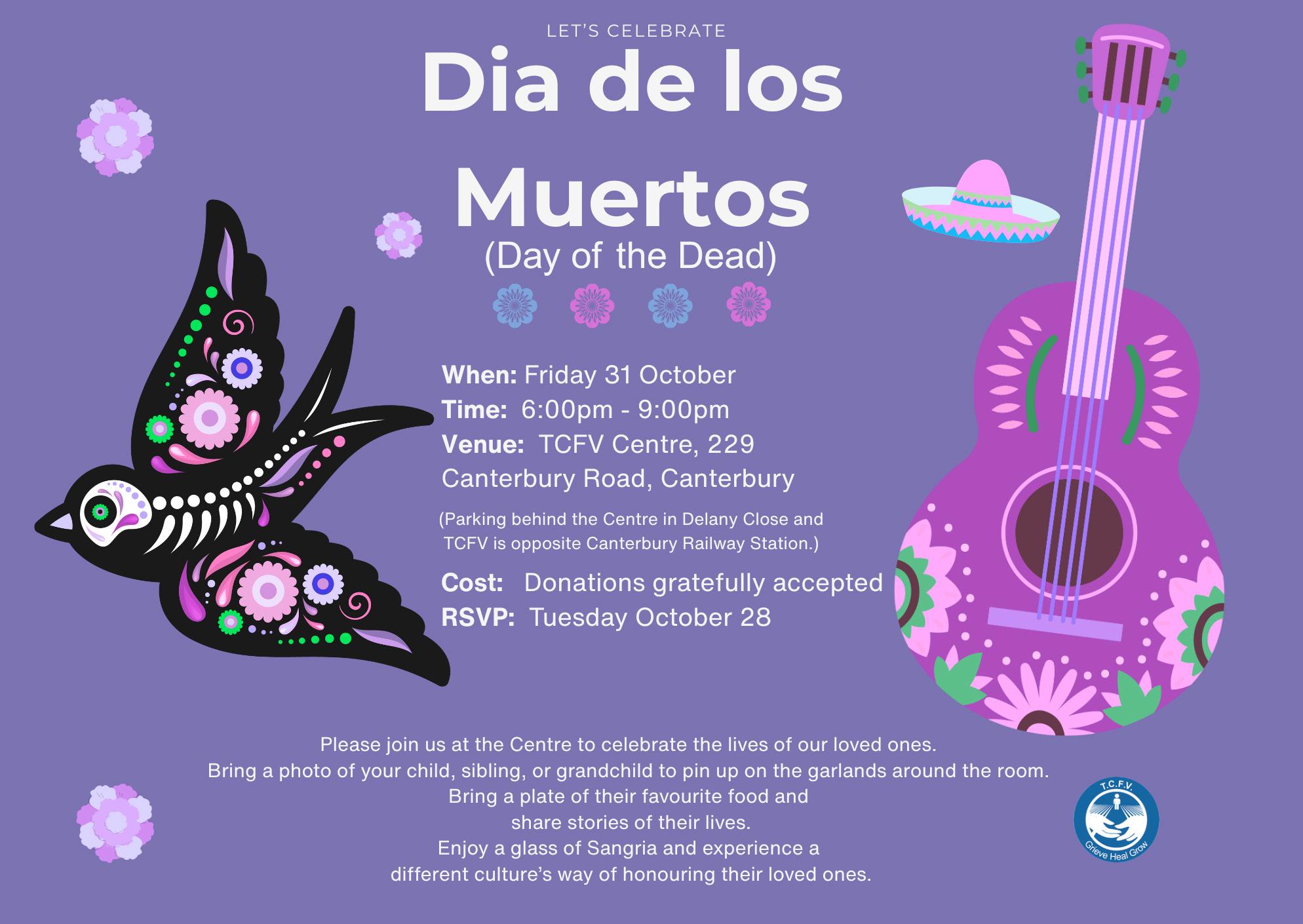
A living and changing memorial to your loved one might be a garden. There’s a lot of research to show that nature, generally, is good for your mental health, of course. But it’s also true that getting your hands dirty and making the effort to move your body in this way reduces stress, anxiety and depression.
You may not have access to a back yard, so growing plants might need to happen in pots, on a deck or inside. Even if you do have space, it might be good to start small and aim to grow slowly.
Tips:
• Think of all the senses: sight, smell, touch, taste (edibles), sound
• Check up on the meanings of plants: eg “Flowerpaedia” by Cheralyn Darcey
• Perhaps include water features
• Would you like windchimes? (TCFV installed one at The Foothills Conference Centre at Mooroolbark, during The Gathering held there in 2022)
• Consider plaques or quotes
• Think about any items from your loved one
• Maybe hang some solar lights / candles
• Are there significant plants, or plants that attract wildlife?
• If there’s room, perhaps somewhere to sit
Some flowers you may like to use:
Love
Red Rose – Deep love, passion, and devotion.
Pink Rose – Grace, admiration, and gentle love.
White Rose – Pure love, remembrance, and reverence.
Orchid – Rare and delicate love, beauty, and strength.
Camellia (Red or Pink) – Long-lasting love and admiration.
Forget-Me-Not – Enduring love, remembrance, and loyalty.
Carnation (Red or Pink) – A mother’s love; admiration and affection.
Grief & Remembrance
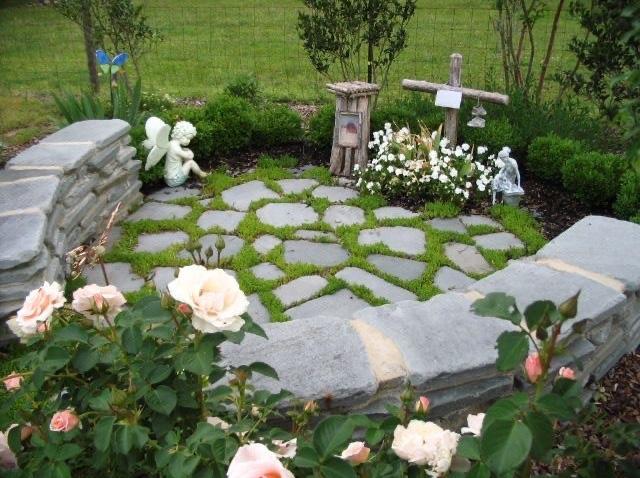
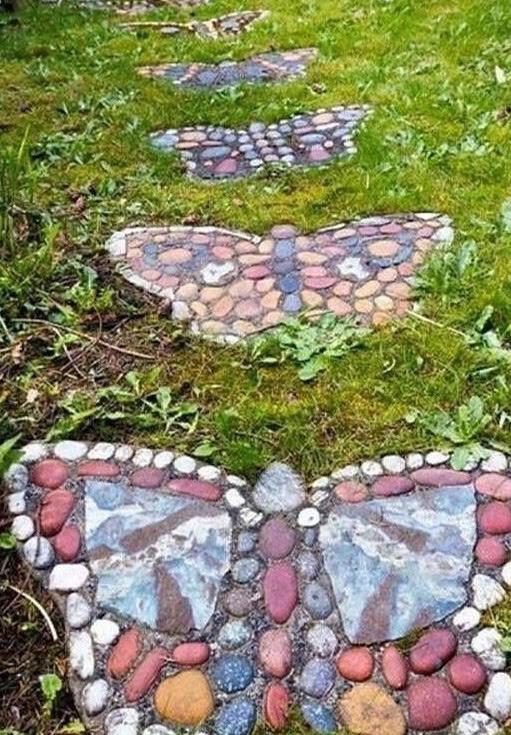
Lily (especially white) – The restored innocence of the soul; peace and mourning.
Chrysanthemum – In Europe/Australia: Solemn grief and sympathy. In Asia: Honour, respect, and longevity.
Gladiolus – Strength of character and moral integrity, often used in farewells.
Marigold – Grief, remembrance, and connection to the afterlife (especially at Día de los Muertos).
Poppy (red or white) – Red: Remembrance and honour for the fallen. White: Peace and eternal sleep.
Hyacinth (purple) – Sorrow, regret, and deep mourning.
Violet – Modesty, remembrance, and faithfulness in grief.
Look at When You’re Grieving, Garden and The Benefits of ‘Grief’ Gardening for more background information and ideas to get you started.
With grief in spring, the cycles of life and death can be . . . complicated.
On the one hand, reminders of hope or renewal or redemption can be comforting and inspiring. On the other, grief in spring can mean these reminders feel painful and alienating if you’re feeling personally disconnected from them. Seeing a bleak winter landscape turn a lush green can be inspiring. It gives hope for the evolution of our lives after loss while simultaneously feeling like an unwanted reminder that the world keeps turning. In its most practical terms, this spring stretch might bring beautiful moments with friends, family, and in nature. With the joy and comfort you find there, you might also find some pangs of guilt. No matter the highlights of this day, week, or month, it will likely also include difficult reminders. There are reminders that another season has come and gone. We can be left feeling hyperaware that we’ve moved even further from a past that we love and miss.

You might find yourself reminded of the family members absent from your tables and meals. Or perhaps you find yourself all alone at a time of year when others are gathered with family. You might find yourself surrounded by people, but acutely aware that loneliness is not simply about being alone. It is about missing a certain person or a certain type of relationship. It’s what can leave us feeling lonely in a room full of people. Wouldn’t it be great if there were some magic words to wipe away all the griefy pain of spring?
Spoiler alert: no magic words here to fix grief in spring because grief isn’t something that needs fixing. But we can offer a few gentle reminders as you navigate this new season.
1
2
Decide to find comfort where you can - be it in the cycles of nature, spiritual reminders of rebirth and redemption, or time with friends and family.
Create space for the grief. When the sun is shining and the birds are singing or we’re gathered with people we love, it can feel like we should just focus on the positive - embrace that attitude of gratitude. But gratitude isn’t an antidote to grief. It is a companion to it. We can still create room to acknowledge all that has been lost alongside all that remains. Feeling our grief in spring fully while being grateful for the hope in the season is a helpful practice.
3 Remember, your pain is not your connection. If you are lucky enough to be finding bright spots in the spring season that seem to be easing your pain or making it easier to carry, embrace them. Your connection to your past and those you have lost, lives in your memories of past spring seasons, in the ways they shaped who you are and how you live in the world, in the things that you do in their memory.
4
5
Spend time in nature. Though some may find greater spiritual connection to nature than others, on a tangible, physiological level, nature is good for us. Research has found that being in nature can lower our stress hormone levels, which in turn can lower our anxiety and depression. Studies have shown that spending time in nature can improve our mood, make us more mentally sharp, lower blood pressure, and there is even some evidence it can boost our immune systems. Though being in nature is good for us any time of year, the change of the seasons can be an especially impactful time to connect with the natural world.
Set an intention for the coming season. This doesn’t have to be something huge. Any small thing that you want more of or less of in your day-to-day life can be an easy and realistic place to start.
Whatever grief in spring brings for you, remember that we are never as alone as we feel. If the seasonal changes have you feeling down, you’re not alone. Statistically, it is actually surprisingly common in the spring. So reach out -- to friends and family, to a support group or counsellor, or to others in your community.
Taken From: https://whatsyourgrief.com/grief-in-spring/ [The TCFV library has a copy of the book that accompanies this website: “What’s your grief? Lists to help you through any loss” by Eleanor Haley and Litsa Williams]
(continued from the WINTER edition of Compassionate Connections)
“The best and most beautiful things in the world cannot be seen or even touched—they must be felt with the heart.”
It was late December (1998). I hadn’t gone back to work and had very little money. Then I started to find money wherever I went. It started with a dollar coin I found on the footpath and then I started to find notes. Sometimes I’d find a coin, but other times it was notes. After a while it became mostly notes, especially $20 notes. During December and January 2000, I found over ten of them on pavements while walking around the streets. For example, one day while I was at Greensborough, I was walking along the main street, it was a bit windy when a $20 note flew in front of me, I stopped and picked it up and looked around to see if anyone was looking for it. But there was no-one nearby or anyone further away searching for their lost money. After waiting for some time, I walked off with the money. A couple of days later, my wife Laurie and I were walking to the local medical Centre in Hurstbridge to see the doctor. We were chatting about the notes I kept finding, when there in front of us on the path was a $20 note. We couldn’t see anybody else around in this area. So, this went on and on for a couple of months.
Each day I took our dog walking in the remnant bushland opposite our house. One night I had a dream and in it Chione told me I’d find some money near the old, abandoned house there. I didn’t think about it the next morning, but as usual I took the dog for a walk in that area. On the way back I stopped near a plum tree at the back of the house for a while thinking and had a cry. As I stood there, I scraped my boots into the ground and eventually looked down. In the soil were some tattered cloths, some coins and a $10 and $5 note, about $20 in all. How this is possible I do not understand, but I do know that these experiences really happened.
In the dreams, Chione would give me messages. One night I dreamt she told me to buy a poster of an eagle that I would see in a shop and to give it to Jamie. Jamie was a local small businessman I had got to know and became friendly with since Chione’s death. His brother had died in an accident and so we had a lot of shared feelings. I didn’t know where or how I would find this poster, or why I had to give it to Jamie. The next day I was walking past a shop in Greensborough and saw the
eagle poster I had dreamt about in the front of a rack of posters. I promptly bought it and despite feeling a bit nervous took it to Jamie. I walked into his shop and with some unease said that Chione told me to buy it and give it to him. I hoped he would understand. I was pleasantly surprised that he didn’t think I was mad and said he knew who it was for. He explained that a family friend of his who had died was obsessed with eagles and his room was covered in posters of them. He said he would pass it on to his mother. Later I got a card from this lady thanking me for the poster.
Someone had given me the name of an old lady, Joan, who they said might be able to help me contact Chione. I rang her and we arranged to meet and have a reading at her home. I told her nothing about me. That day I boarded the train to go and see Joan. I went to sit down and on the seat was lying a small, blue cloth butterfly. The butterfly is the symbol of rebirth. When I got to the reading Joan described Chione’s blonde hair and facial appearance exactly and then depicted her as a young, lively girl in high spirits. Then Joan said, “She’s excitedly jumping around, laughing and says something about money on the pavement.” Joan then said, “I don’t know what that means”. But I certainly did. Later, Joan also said, “Chione says you will decide to go somewhere, but then you won’t go. But sometime later you will go there.” This made no sense at all to me. Joan also asked me if I knew someone called Gabriele, as Chione had mentioned the name. I said that I didn’t know anyone named Gabriele. Although I was puzzled by some of the information given to me by Joan, the reading was enough for me to feel Chione’s presence and that Chione was indeed still alive somewhere.
On Sunday morning, Laurie suggested we go to Healesville Sanctuary for the day. The children and I agreed, but we were very slow having breakfast and getting ready. We all seemed too tired and lacking in enthusiasm and as time went on, we decided to stay home. The next morning, I was up early and soon joined by the others. We were feeling brighter and so I suggested we get ready and go to Healesville. Everyone was eager and we packed up and went. After wandering around looking at many of the animal enclosures, we decided to visit the Wild Bird Display, as we hadn’t ever seen it before. One of the birds we saw that day was a
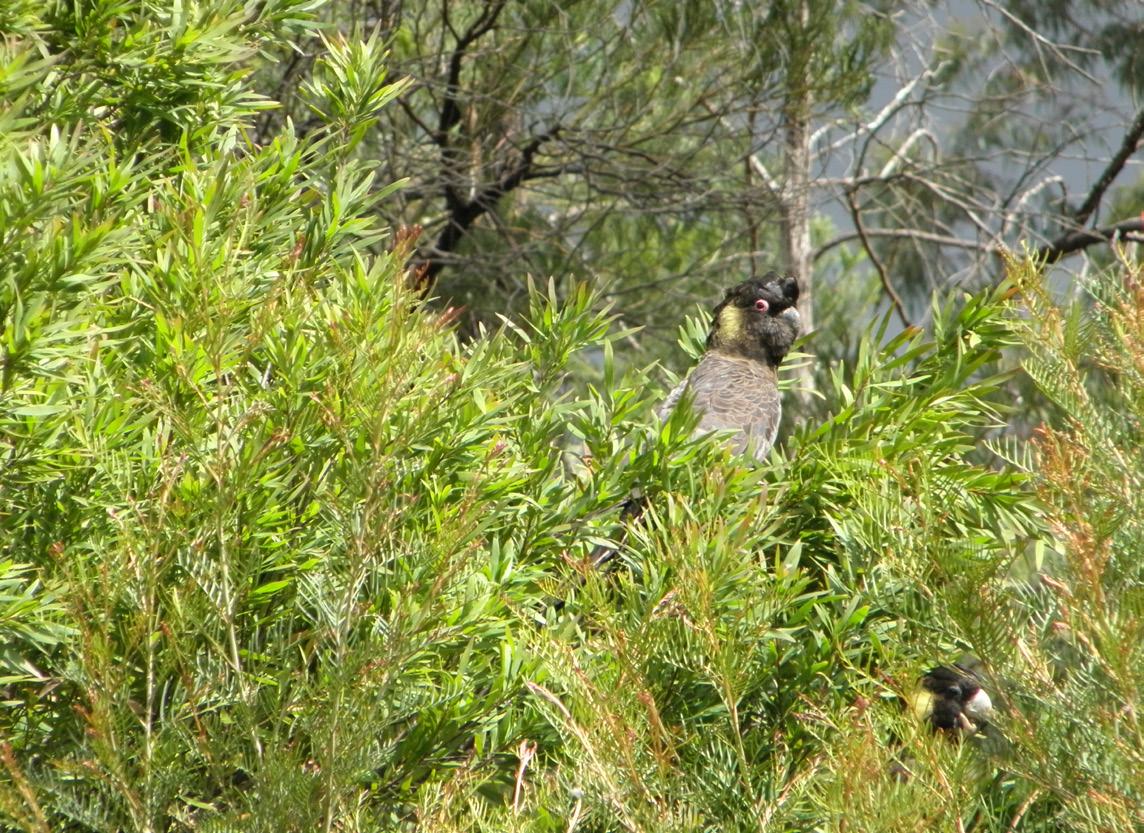
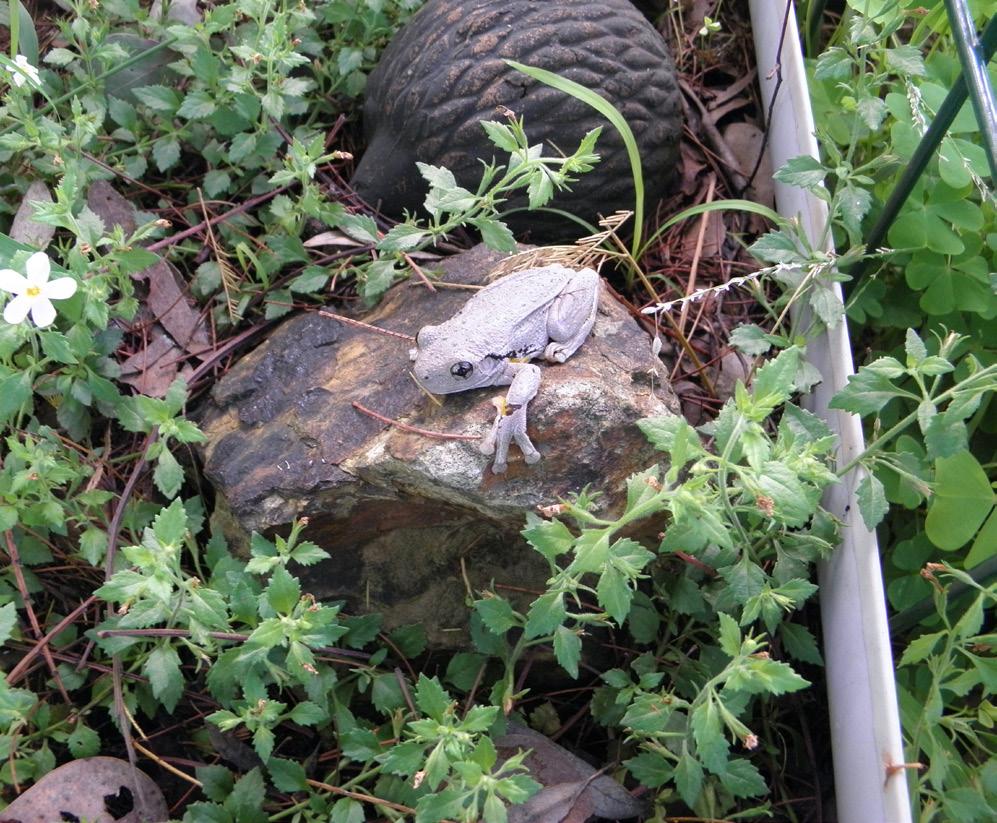
Wedge-tailed eagle named Gabriele. Gabriele had just started back at the Wild Bird Display that day after a few weeks’ rest. If we had come the day before we would have missed seeing her. Eagles are renowned as spiritual symbols.
Later, I dreamt that Chione told me I would meet this woman who I had briefly met more than a year earlier. She had worked at a place where I had done a computer course: we had only spoken a couple of times to say hello and so I barely knew her. I didn’t even know her name and I had not seen her since then. I didn’t understand this message or the reason behind it. The next day I was walking along the main street of Greensborough and to my great shock passed this lady. She saw me and we smiled at each other. I was a bit taken aback and didn’t quite know what to say, so I didn’t stop. After I passed her, though, I felt very guilty that I didn’t stop, as she was the woman Chione told me I’d meet. I went into a shop and when I came out some minutes later, I passed her again. She looked very sad. This time we both stopped and talked for a short while. We then went to have a coffee and chatted some more. She told me her brother had killed himself and how difficult life had been since then. I told her about my circumstances. We talked for a long time and in our shared sorrow comforted each other. I knew then why Chione had told me about this lady and the reason I would meet her. It was so typically Chione still helping people out, by way of me, even though she was in another place. These types of events continued through the next few months, each incident encouraged me, but was not enough, I wanted more. It was like I was on an emotional roller coaster; after each incident I was up for a while, then depressed again.
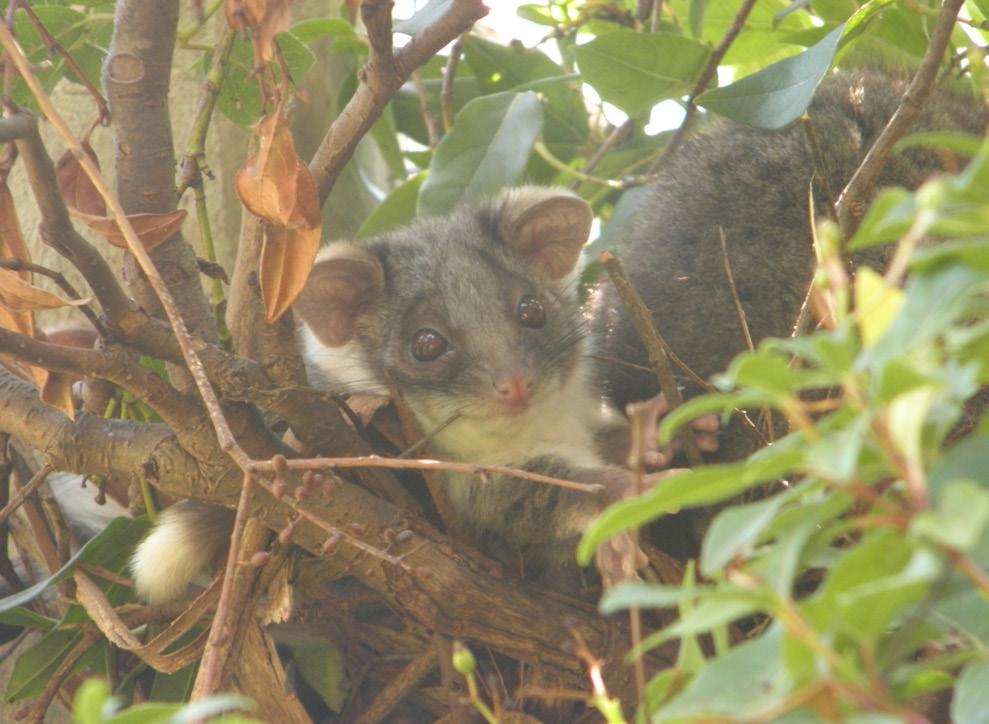
Time and time again, I return to the shelter of the garden, To the earth, the plants and the wildlife, Seeking some solace and to rest. A serene place to help soothe my troubled mind, To think deeply about things, Or to completely turn off, Shifting my psyche to calm and still. To get my hands in the soil, And have my senses swept away, Coming back alive to the natural world, Its sights, sounds and smells uplift and inspire me, Finding once more the joy in simple things.
Steven Katsineris ~ 2016.
A death anniversary is so much more than a date on a calendar. For bereaved parents, siblings, and grandparents, it may feel like a thunderclap, loud, jarring, and inescapable. It marks the moment life changed forever. No matter how many years pass, the grief may return with a sharpness and sadness that surprises even those who live with it every day.
For bereaved parents, the death anniversary may bring a flood of memories—
♥︎ the sound of their child’s laughter
♥︎ the curve of their smile
♥︎ the dreams that were unfulfilled.
It may stir questions that never find answers—
♥︎ What if they were still here?
♥︎ Who would they have become?
Even years later, the longing doesn’t disappear; it just shifts form.
For bereaved siblings, the death anniversary can stir a deep ache for the person who was supposed to share life’s milestones. Whether they were close in age or not, a sibling is often the person who knows your entire history. Their absence can feel like a part of your own story is missing. Siblings may struggle with being the forgotten mourners, silently grieving while the world focuses on the parents.
For bereaved grandparents, the pain of the anniversary can be twofold, mourning the loss of their grandchild while also witnessing the ongoing grief of their own child. They may feel helpless, heartbroken, and overlooked. Grandparents often carry their sorrow quietly, trying to stay strong for everyone else, while carrying a unique and enduring grief of their own.
♥︎ Heightened emotions – waves of sadness, anger, guilt, or disbelief may return
♥︎ Physical symptoms – fatigue, poor sleep, headaches, or anxiety
♥︎ Feeling isolated – it can seem like no one remembers, or no one wants to talk about it
♥︎ Desire for connection – some people feel the need to honour their child, sibling, or grandchild in a meaningful way
All these reactions are normal. The anniversary may bring back the intensity of early grief, even if you’ve found ways to carry it more gently throughout the year.
Here are some ways bereaved parents, siblings, and grandparents may choose to acknowledge the day
♥︎ Light a candle at the same time each year
♥︎ Visit a special place: the gravesite, a tree planted in their memory, or somewhere you shared together
♥︎ Look through photos, videos, or letters
♥︎ Share memories with trusted friends or family
♥︎ Do something your loved one enjoyed: play their favourite song, cook their favourite meal
♥︎ Take the day off work if possible, or plan something gentle for yourself
♥︎ Perform an act of kindness in their name

Some people want to be surrounded by others on the day. Others need solitude. Both are okay. Some want to talk about their loved one. Others may not be ready.
Grief is deeply personal, especially on these sacred anniversaries. The anniversary of a death is not just a date. It’s a marker of love, loss, and pain. Whether you’re a bereaved parent, sibling, or grandparent, you’re allowed to feel everything that arises on that day. Grieving in your own way, in your own time, will help you to heal gently. ��
Susan Meyerink Bereaved Mother of Chance
Source: https://www.theredhandfiles.com/communication-dream-feeling/
I have experienced the death of my father, my sister, and my first love in the past few years and feel that I have some communication with them, mostly through dreams. They are helping me. Are you and Susie feeling that your son Arthur is with you and communicating in some way?
Cynthia, Shelburne Falls, VT, USA
Dear Cynthia,
This is a very beautiful question, and I am grateful that you have asked it. It seems to me, that if we love, we grieve. That’s the deal. That’s the pact. Grief and love are forever intertwined. Grief is the terrible reminder of the depths of our love, and, like love, grief is non-negotiable. There is a vastness to grief that overwhelms our minuscule selves. We are tiny, trembling clusters of atoms subsumed within grief’s awesome presence. It occupies the core of our being and extends through our fingers to the limits of the universe. Within that whirling gyre all manner of madnesses exist; ghosts and spirits and dream visitations, and everything else that we, in our anguish, will into existence. These are precious gifts that are as valid and as real as we need them to be. They are the spirit guides that lead us out of the darkness.
I feel the presence of my son, all around, but he may not be there. I hear him talk to me, parent me, guide me, though he may not be there. He visits Susie in her sleep regularly, speaks to her, comforts her, but he may not be there. Dread grief trails bright phantoms in its wake. These spirits are ideas, essentially. They are our stunned imaginations reawakening after the calamity. Like ideas, these spirits speak of possibility. Follow your ideas, because on the other side of the idea is change and growth and redemption. Create your spirits. Call to them. Will them alive. Speak to them. It is their impossible and ghostly hands that draw us back to the world from which we were jettisoned; better now and unimaginably changed.
With love, Nick.
Nick Cave on Australian Story: https://iview.abc.net.au/video/NC2502Q011S00
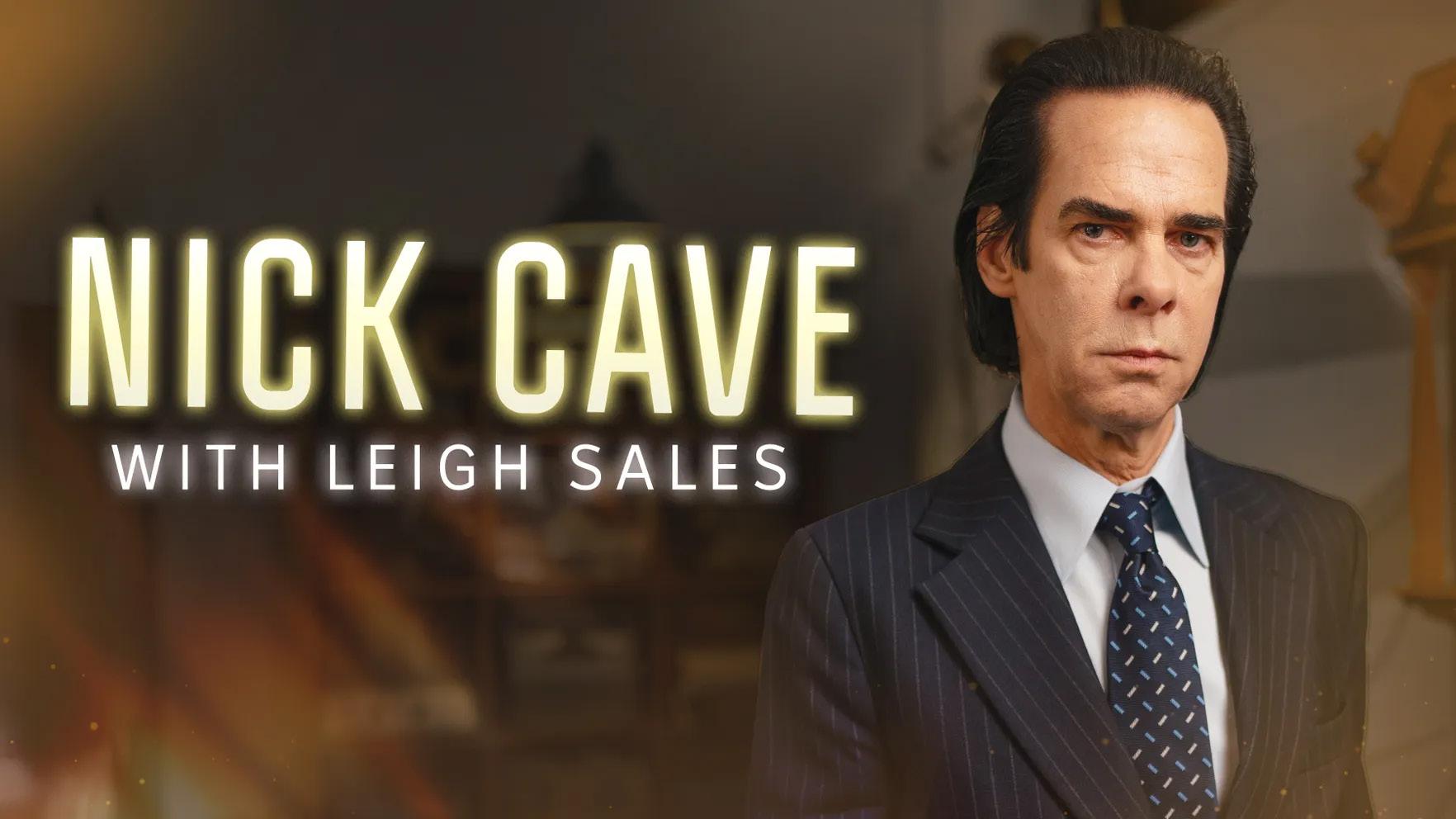
John White, a TCFV member, recently passed away, aged 66. John was a regular attendee of the social group which met at The Rumour Mill Café at McAdam Square in Croydon Hills.
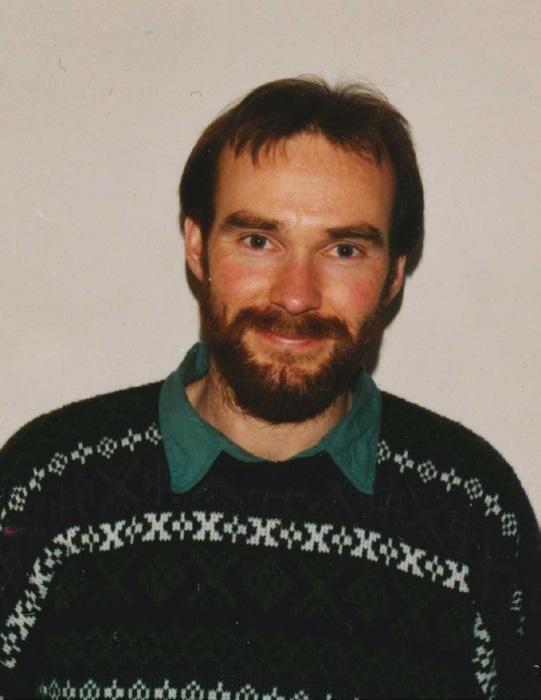
John was living with grief following the death of his son Alex in a motorcycle accident in 2022. This tragic loss had challenged John in many ways, and he seemed to value the opportunity to talk about his grief, and to listen to others, as we shared in the informal setting of the coffee shop.
John was diagnosed with a brain tumour in 2024, which sadly turned out to be a fairly aggressive form of tumour which took his life on 26th June this year. My wife Jenny and I attended the memorial service for John on 14th July, a truly memorable occasion which told the story of his life with powerful tributes from family and friends.
As is often the case at funerals, we discovered things about John that we would have loved to share with him in person. We knew a lot about just one small, important corner of his life as he dealt with the death of his son. It is fair to say, as many of us in TCFV will have experienced, that John’s life was severely disturbed in his grief. His business was in the automotive industry, making valves for high performance cars. It was a highly technical field requiring precise skills, which he clearly had, with clients such as Peter Brock and other finalists at the Bathurst 1000 race. It was the business he was working in with his son Alex, hoping to pass it onto him in some form.
Following Alex’s death, John found it increasingly difficult to engage in that part of his former life. Many of you reading this will be able to identify with that sense of dislocation following the death of a child, sibling or grandchild. Alex’s sibling, his brother Nelson, has also inherited John’s interest in things mechanical and electronic. Nelson is now working at a very high level in the Air Force, with the development of drone technologies. He was also responsible for much of the planning and delivering of the tribute to his father. His eulogy and the power point photo tribute were both beautifully done.
In meeting with John over many months at the social coffee group, it has been a privilege to have known him. He introduced me to some of his eclectic music tastes – we will be attending a concert by The Cowboy Junkies, at the Palais Theatre, in November, in honour of John. A ticket had been purchased for him to attend the concert, which he was looking forward to very much. He also showed great compassion for the experiences of others in the group, as he dealt with the depth of his own experiences. It was truly a great example of how The Compassionate Friends model of peer-to-peer support can work.
In closing, I would encourage all of us to continue finding ways of seeking and offering support to each other. We remember John with great fondness from meeting him in that context of mutual support.
To quote from the order of service at his memorial:
‘John was an eccentric old soul with a heart full of kindness. He was curious, caring, inventive and funny.
Loved, missed and very dear.’
Vale John White.
Kevin Purvis

by Victoria Cull
This book (which is available for loan in the TCFV library) deals with the death of the author’s granddaughter, Nicole, at age 15 years, and the grieving period following that event.
Cull is a deeply religious person (as are her key family members, including Nicole) and her belief in God is central to how she understands and lives her life. Unsurprisingly, her beliefs feature prominently in the way she attempts to understand Nicole’s illness and death.
The first 14 chapters, which are all quite short, deal with Nicole’s life and the impact on her and her family of her cancer diagnosis and treatment and her premature death. Her funeral service is covered in detail in chapter 19. Clearly Nicole was a loving, giving, energetic and talented girl.
The remainder of the book deals with Cull’s attempts to come to terms with the loss, examined mostly through her religious beliefs and with reference to bible passages. She asks the questions many ‘believers’ who have lost a child or grandchild would ask – why did a loving God take this beautiful person away, how can I understand God’s will in these terrible circumstances, and how can I move on with my own life and still maintain my belief in a loving God?
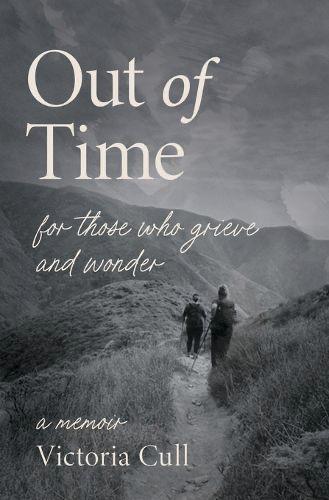
Cull recognises that places of wonder – the natural world, the beauty and extent of the night sky – make us appreciate the vastness of the universe and ‘’confirm that there is some life force out there’’ that we cannot understand. She feels her grief fully and details how the bible’s teachings help her to deal with her grief by deepening her belief in God. She describes how she learns to walk alongside the unanswered questions about Nicole’s death and do so ”with grace and peace”.
In the second half of the book, Cull refers to numerous writers and theologians who may be unfamiliar to readers who are not versed in her particular branch of Christian teaching. These passages will be less accessible than other parts of the book to those who don’t have Christian beliefs. The book also provides questions for journalling that may be useful to readers, whether or not they have religious beliefs.
Although the author’s grief journey takes place against a background of a deep belief in a Christian God, her book does provide some useful insights for grieving parents and grandparents more generally.
Karen Wheelwright
Bereaved Mother of Richard
The Compassionate Friends Victoria is part of a worldwide organisation, which was founded in England in 1969 and established in Victoria in 1978. It is a mutual assistance, self-help organisation offering friendship and understanding to families following the death of a child, sibling, or grandchild of any age and from any cause. The primary purpose is to assist them in the rebuilding of their lives after the death of their child, sibling, or grandchild and to support their efforts to achieve emotional and mental health.
TCFV Staff
CEO: Alex Hamilton
Operations Manager: Andrew McNess
Community Education & Communications Coordinator: Jane Moschetti
Volunteer Engagement Coordinator & Admin Support: Natasha (Nat) Ballingall
Sibling Coordinator: Jude Chrisan
Events & Admin Support: Nicole Mercandel
IT: Jesse Bendel
Board
President: Kevin Purvis
Vice President: Amanda Bond
Secretary: Claire Kuhnell
Treasurer: Gaurav Guliti
Board Member: Bruce Houghton
Board Member: Sonia Aberl
Board Member: Ann Smith
Board Member: Christy Robers
The Compassionate Friends Victoria Patron: Rhonda Galbally AC
Grief support – available on 03 9888 4944 / 1300 064 068 Bereaved drop-in Centre, Hours 9.30am – 4.30pm Monday to Friday
Disclaimer: Unless expressly stated, the views expressed in articles, poetry etc. in this magazine are not necessarily the views of TCFV Board, Staff or the editorial team. The editor reserves the right to edit any contribution. Permission is given to Editors & Chapter Leaders of The Compassionate Friends to reprint material from the magazine. We request that credit be given to the author & their TCF Chapter.

Note 1: Unless stated otherwise all groups are open to bereaved parents, siblings and grandparents – 18 years and above – who are bereaved through any means.
Note 2: Sometimes, group meeting details need to be updated between when the magazine goes to print and when it is delivered to your letterbox or Inbox. For the most up-to-date listing of meetings, please visit: www.tcfv. org.au/support-groups
Support Group Meetings provide bereaved parents, siblings and grandparents (18+ years) the opportunity to meet in a safe environment with others who have “been there”, who understand and care. Group attendees report that meetings are an essential part of their “learning to live again” journey.
Social Support Group Meetings are similarly led by group leaders. They are a lovely social opportunity for bereaved people, often held at a cafe. Discussion is more general, although can sometimes centre on grief-related issues. If you are needing more substantial time to explore your grief-related issues (and this can particularly be the case when you’re newer in your grief), we recommend a formal support group.
I have baby-sitting problems. Would it be alright to bring my child with me? While we understand the difficulties of finding childcare, we must ask that out of respect for the needs of others, you do not bring children (under 18 years of age) to meetings.
Someone in my household has a respiratory illness but I don’t. Can I still attend a meeting? Meetings, by design, have people sitting in close proximity to one another. If someone in your household is sick, we would prefer that you not attend a face-to-face meeting in that month.
Bereavement support for under-18s. While TCFV’s services are for individuals 18 years and above, there are a number of other organisations that provide under-18 services, such as Grief Australia, Headspace and Jesuit Social Services. A listing of these services can be found at: www.tcfv.org.au/under-18s
I’m new to meetings. Should I speak with the leader/s first before attending a meeting? We highly recommend you speak with the group leader prior to your first meeting at any TCFV group. Call TCFV on 9888 4944 (Melbourne)/1300 064 068 (regional) and we can help arrange a chat. Speaking with the leader is a valuable introduction to the group and what it can offer you in your grief journey.
Do groups require registration to attend?
Unless specified otherwise, groups do not require registration. However, as per above, if you are attending your first meeting of a group, we ask that you let us know –(03) 9888 4944 (Melbourne) / 1300 064 068 (Regional Victoria & Tasmania
We have TCFV volunteers in the townships / regional cities listed below who have some availability for a peer support phone chat or coffee catch-up:
Bairnsdale – Elvie Ballarat – Robyn Camperdown – Judi Castlemaine – Matthew Horsham – Ronda Melton – Deb Wodonga – Lynne
Please enquire on 1300 064 068
Bayside
4th Wednesday 7pm-9pm (Jan-Nov)
Bendigo 4th Tuesday 1:30pm (Jan-Nov)
Canterbury Daytime
4th Wednesday 11am (3rd Wed in Dec)
Highett Neighbourhood Community House, 2 Livingston St, Highett
Long Gully Community Centre, 23-29 Havilah Rd, Long Gully
TCFV Centre, 229 Canterbury Rd, Canterbury NEW Canterbury Wings – Loss of a Child under 5 years 2nd Tuesday 7:30pm (Feb-Dec) Registration requested: please call 03 9888 4944 to do so.
Canterbury Siblings-specific meeting 3rd Tuesday 7.45pm
Canterbury Suicide-bereaved 4th Monday 7:30pm (Jan-Nov)
TCFV Centre, 229 Canterbury Rd, Canterbury
TCFV Centre, 229 Canterbury Rd, Canterbury
TCFV Centre, 229 Canterbury Rd, Canterbury Eltham 1st Thursday 11am (Feb-Dec)
Geelong Last Tuesday 7:30pm (Jan-Nov)
Eltham Library Community Room, Panther Place, Eltham
Anam Cara House, Zone/4 Nicol Drive South, Waurn Ponds NEW Geelong Siblings 1st Tuesday 6pm-7.30pm (Feb-Dec)
Virginia Todd Hall, 9 Clarence St, Geelong West Registration requested. Please do so via: https:// events.humanitix.com/survivingsiblingsgeelonginpersonmeetings
Menspace 3rd Wednesday 7pm-9pm (Feb-Dec)
Mildura 2nd Saturday 11am (Feb-Dec)
Portland 3rd Tuesday 7pm (Feb-Dec)
Rowville 1st Friday 1pm (Feb-Dec)
TCFV Centre, 229 Canterbury Rd, Canterbury
MADEC Community College, 133-137 Madden Ave, Mildura
Please contact 1300 064 068 for venue details
Bridgewater Centre, 64 Bridgewater Way, Rowville Somerville Bereaved Parents Group
*Run by ProjexJ (projexj.org), with support from TCFV 4th Thursday 10am-1pm (Jan-Nov)
Sunshine 3rd Tuesday 7pm (Feb-Dec)
Sunshine Bereaved Through Suicide 1st Tuesday 7pm (Feb-Dec)
Warrnambool
ONLINE SUPPORT GROUP
Suicide-bereaved
Wednesday 7:15pm (Feb-Dec)
Somerville Community House, 2/21Worwong Avenue, Somerville
Salvation Army Drop-In Centre, 42 Devonshire Rd, Sunshine
Salvation Army Drop-In Centre, 42 Devonshire Rd, Sunshine
Archie Graham Community Centre, 108 Davis Street, Warrnambool
Which day in the month is the meeting held? Where is meeting held?
3rd Thursday bimonthly 7pm (Feb, Apr, Jun, Aug, Oct, Dec)
Bereaved through any means 1st Tuesday monthly 7:30pm (Feb-Dec)
NEW Siblings-specific
3rd Tuesday: 6pm-7pm
Held via Zoom. To register to receive the Zoom link prior to each meeting, please visit: www.tcfv.org.au/online
Held via Zoom. To register to receive the Zoom link prior to each meeting, please visit: www.tcfv.org.au/online
Registration requested. Please do so via: https://events.humanitix.com/ survivingsiblingsgeelong-onlinemeetings SOCIAL GROUP Which day in the month is the meeting held?
Box Hill
Geelong
2nd Thursday 7pm (Jan-Nov)
Bookings are essential. Please call 03 9888 4944.
2nd Tuesday 10am (Feb- Dec)
Where is meeting held?
Box Hill RSL, 26-28 Nelson Rd, Box Hill
Brioche Café, 175 West Fyans St, Newtown Hawthorn East
Southern Peninsula
4th Tuesday 7pm (Feb-Nov)
Bookings are essential. Please call 03 9888 4944.
1st Tuesday 12 noon (Feb-Dec)
ART THERAPY GROUP Which day in the month is the meeting held?
Express Yourself Through Art at TCFV Centre
Online Express Yourself Through Art
3rd Monday of the month 7:30pm (FebDec) Registration required: www.tcfv.org.au/events
1st Thursday of the month at 1.30pm (Feb-Nov)
To register, please visit: www.tcfv.org.au/events
Café Paradiso, 213-215 Camberwell Rd, Hawthorn East
Please contact 1300 064 068 for venue details
Where is meeting held?
TCFV Centre, 229 Canterbury Rd, Canterbury
Held via Zoom.
Please note: Bereavement Peer Support in Hobart Bereaved parents, siblings and grandparents in Hobart meet informally at a café setting on a regular basis (often a weekend afternoon). For more information on this non-TCFV support network, including dates and times, please contact our telephone support line on 1300-064-068.
At The Compassionate Friends Victoria (TCFV), we walk beside families shattered by the loss of a child, sibling, or grandchild, no matter the age, no matter the cause.
Every member of our team has faced the unimaginable and come through it with a deep commitment to helping others find their way.
But right now, we’re facing a 30% funding shortfall. That gap threatens the very services that thousands of grieving families rely on support groups, our grief line, and our drop-in centre, which together offer lifelines when everything else has fallen away.
In just one month, TCFV supported over 550 bereaved parents, proof that the need is growing. Yet, despite expanding from 24 to 35 support groups across Victoria, our core funding hasn’t increased in over a decade.
Introducing our 500 Hearts Initiative, a bold campaign calling on 500 people or businesses to give $500 each, raising $250,000 to protect and sustain our most vital services.
Join 500 Hearts One heart. One gift. A lifetime of impact
Your $500 gift will:
• Keep 35+ peer support groups open across Victoria
• Ensure our grief support line continues without interruption
• Provide free, lived-experience support to parents, siblings, and grandparents
• Sustain our drop-in centre—a sanctuary for those in raw grief
• Fund the dedicated lived experience team who walk this road with others, every day
�� What Our 500 Hearts Receive
• A personal thank you and welcome to the 500 Hearts community
• Recognition on our website and our 500 Hearts Wall at the centre
• A digital 500 Hearts badge to show your support to your clients, family and friends
• Invitations to exclusive events and behind-the-scenes updates
From our Board and CEO
• The chance to hear directly from bereaved families you’re helping
• The lasting impact of knowing your generosity means no one walks alone
Please visit …
www.compassionatefriendsvictoria.org.au/500-hearts/
To request an invoice, email alexh@tcfv.org.au or call 03 9888 4034
All donations are tax deductible.
Thank you for your support.
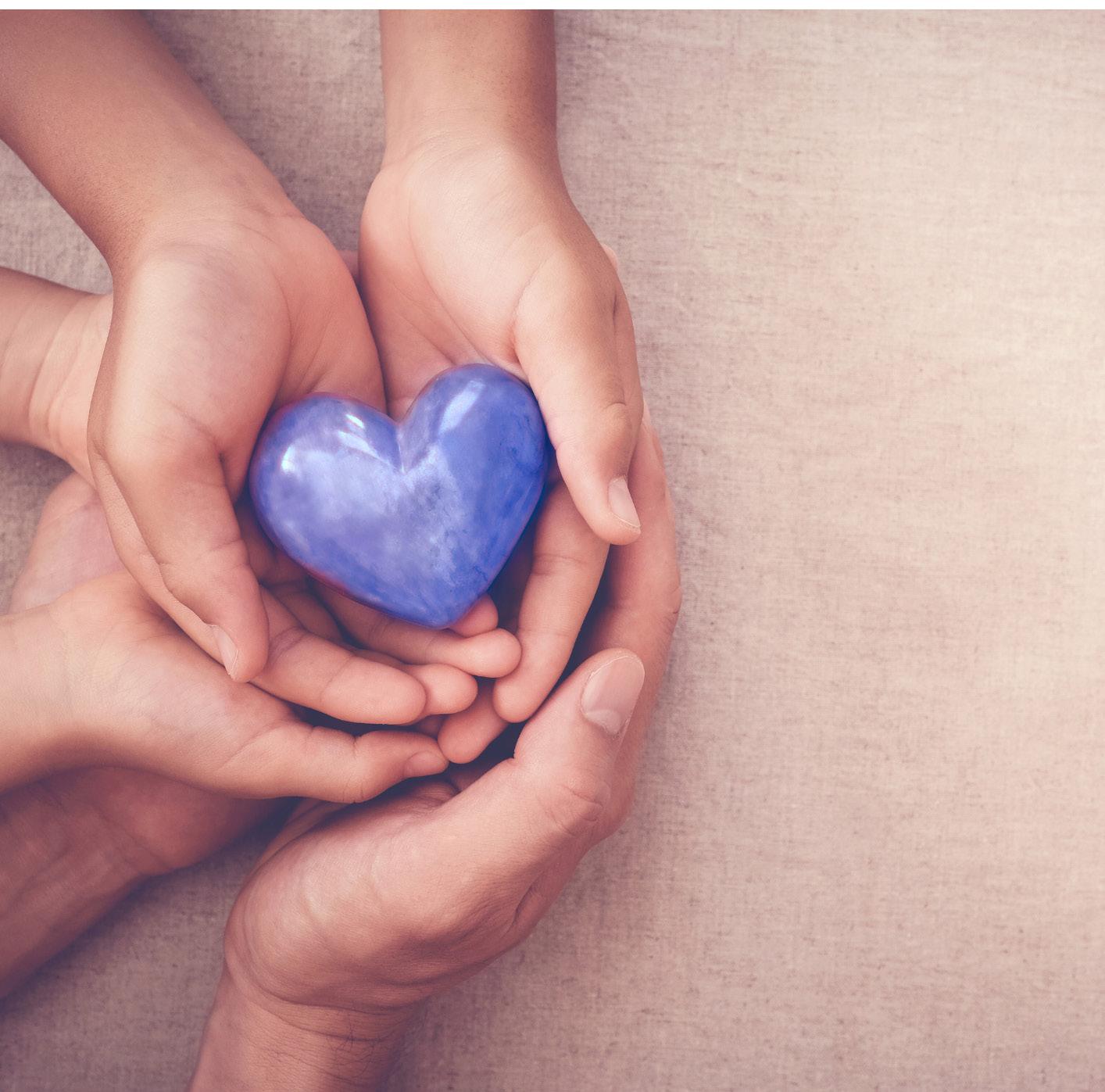
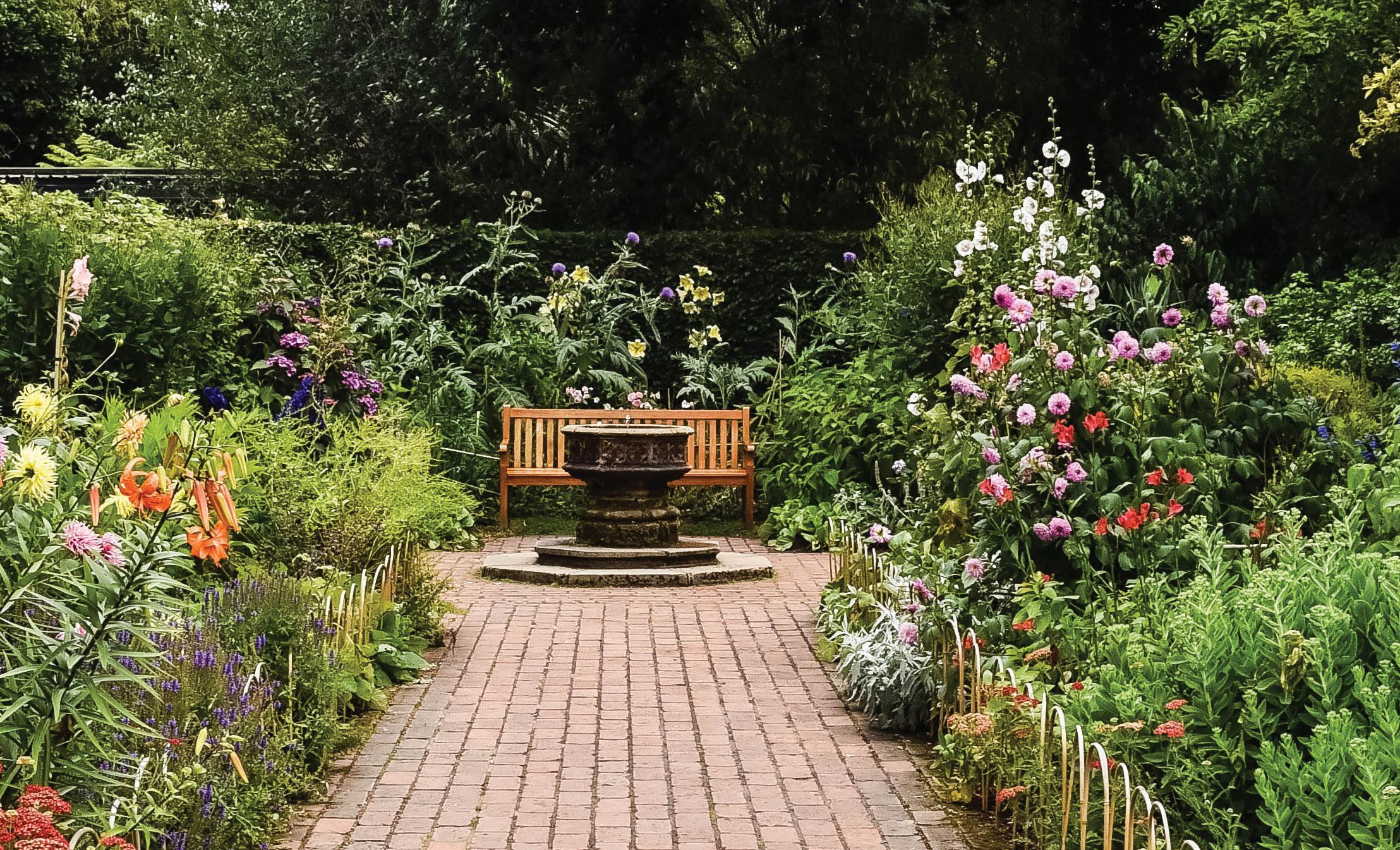



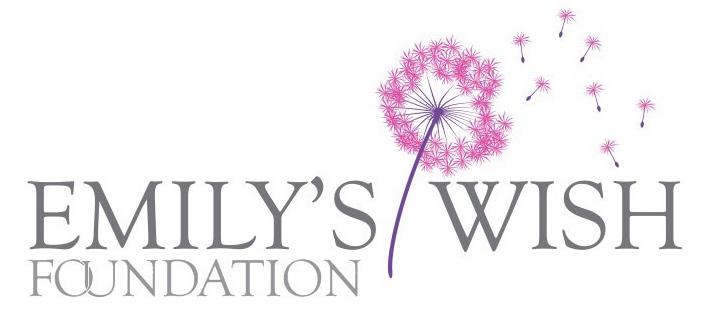
Agnes Tan
Avery Poole
Bendigo Community Bank – Inner East (Ashburton, Balwyn, Canterbury, Surrey Hills)
Bradley Family
Bryn Humphreys
Bunnings Box Hill
Bendel Family
Brunswick United Masonic Lodge
Charles Tegner
Cheryl Lardner
City of Boroondara
Coates Family
Country Women’s Association of Victoria
Dorothy Ford
Eastern Press
Emily’s Wish Foundation
Geelong Cemeteries Trust
Guardian Plan
Harmer Family
Ian Zadow
Jared Dunscombe Foundation
Jennifer O’Reilly
John Brown
Judith Theobald
Justice Connect
Karen Philippzig
ACT & Queanbeyan
New South Wales
Queensland
South Australia
Kidsafe Victoria
Le Pine Funerals
Life Time Trophies
Lord Mayor’s Charitable Foundation
Louisa Ong
Mandala Wines Cellar Door Winery
Marken Hosting
Michael & Maureen Cawley
Mindfull Aus
Nunan Family
Pam & Max Williams
PivotLife
Robyn Arya
Ruth Robinson
Shelia Schutz
Sim Family
SM Creative
State Government of Victoria
Strickland Family
Sue Binzer
The Pethard Tarax Charitable Trust
Tobin Brothers
Trembath Family
Tripleconnect
Yarra Ranges Council
Yvonne Sharpe
Wall, Theresa, Shane & Family
National Number 1300 064 068
TCF Mandurah 0494 149 866
02 9290 2355 Suite 602, 109 Pitt Street, Sydney, NSW 2000
07 3540 9949 505 Bowen Terrace, New Farm 4005 0456 820 133
08 9535 7761 Mandurah Lottery House - 7 Anzac Place, Mandurah 6210
TCF on the internet - United Kingdom www.tcf.org.uk – New Zealand (email) tcf.otago@xtra.co.nz
USA www.compassionatefriends.org – SA www.compassionatefriends.co.za – Canada www.tcfcanada.net/
The Compassionate Friends Victoria 229 Canterbury Road, Canterbury VIC 3126 PO Box 171 Canterbury, Vic. 3126
Support Phone: (03) 9888 4944 Administration Phone: (03) 9888 4034
Email: support@tcfv.org.au Web: www.tcfv.org.au